









By David Rullo | Senior Sta Writer
Carole Zawatsky arrived in Israel for a January mission the day the first hostages were released in a negotiated cease-fire with the terrorist group Hamas.
“The release was announced on the plane by our El Al pilot,” she said. “I was able to make it to my friend’s house in Jerusalem to watch them be helicoptered from the site where they were released to the hospital and be united with their families.”
She left for America the following Sunday, one day after the second group of hostages was released.
“It was a pretty incredible experience,” she said.
Zawatsky spent the week in Israel doing volunteer work that included preparing meals for the families of hostages and IDF soldiers and immersing herself in the horror of Oct. 7.
“I went to the site of the Nova Music Festival. I went to the memorial that had been created with all the cars that were burned
while people tried to escape, met with hostages’ families and went to hostage square,” she said.
As part of the trip, Zawatsky stood in front of released hostage Emily Damari’s house.
“It really made me think about that fine line between bearing witness and voyeurism and how we enter sites of trauma,” she said.
That fine line is important to Zawatsky.
She is the chief executive officer of Tree of Life, the nonprofit created after the Oct. 27, 2018, Pittsburgh synagogue shooting. The Israel trip, she said, forced her to think even more deeply about the work being done by her organization and “what it means to create spaces of memory and trauma.”
Last summer, Tree of Life broke ground on a new building at the site of the deadliest antisemitic attack in United States history. Since then, though, no construction has taken place.
By David Rullo | Senior Sta Writer and Toby Tabachnick | Editor
For the second time in consecutive election cycles a referendum that could have prohibited the City of Pittsburgh from doing business with the state of Israel, or companies that do business with Israel, has been defeated.
During a March 7 Allegheny County Court hearing before Judge John T. McVay, Not On Our Dime and its fiscal sponsor, The Project for Responsive Democracy, stipulated that they did not collect enough valid signatures to get the referendum on the May primary election ballot.
In order to qualify for the ballot, Not On Our Dime needed to submit 12,459 signatures of registered Pittsburgh voters in favor of the referendum. The anti-Israel organization submitted 21,300 signatures but more than half of those signatures were invalid.
During a review process initiated by the Jewish Federation of Greater Pittsburgh with its partners StandWithUs and the Beacon Coalition, 12,530 signatures were identified as defective.
The decision to stipulate to the petition’s deficiencies came late in the evening on March 6, as it became apparent that the signature challenge was going to carry the day.
“We’re not going to prolong the process,” Chuck Pascal, an attorney for Not On Our Dime, told McVay in court.
Not On Our Dime’s stipulation came at a hearing scheduled to consider legal challenges to the referendum filed by City Controller Rachael Heisler, as well as separate challenges filed by Federation, its partners and several Jewish community leaders. Those challenges became moot when Not On Our Dime and The Project for Responsive Democracy acknowledged they didn’t have the signatures required.
The Federation, StandWithUs and Beacon

By David Rullo | Senior Staff Writer
Julie Paris believes that it’s important for American Jews to participate in the World Zionist Congress elections.
“Now more than ever, American Jews need resources to secure our future as thriving communities that can support Israel and fight antisemitism across the country,” she said.
The resources allocated by the World Zionist Congress are significant. Established by Theodor Herzl in 1897, the organization allocates nearly $1 billion annually to support Israel and world Jewry, including the World Zionist Organization, Keren Kayemet LeYisrael – The Jewish Nation Fund and the Jewish Agency for Israel.
The WZC meets every four or five years, according to Herbert Block, the body’s executive director, and acts like a political convention establishing the direction, policies and the next leaders of national organizations, including JNF, the Jewish Agency and Keren Kayemet.
Paris said there’s a lot at stake in this year’s election.
“Since the last elections, America has witnessed an unprecedented wave in antisemitism, in part trigged by the Oct. 7 massacre,” she said. “In the past, too many funding decisions by the major institutions connected to the WZC were made based on partisan interests.”
Paris is the Mid-Atlantic regional director of StandWithUs, an international, nonpartisan education organization that supports Israel and fights antisemitism. She’s also a candidate for the 39th World
Zionist Congress as a member of the Kol Israel party.
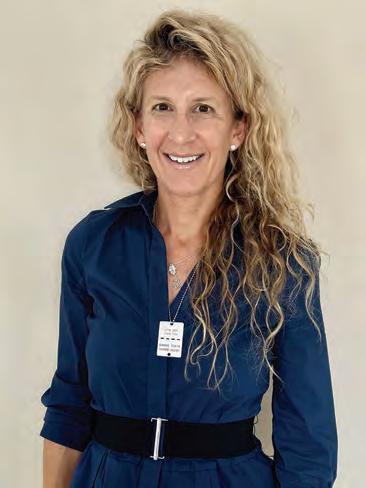
She decided to run, she said, because of the “critical need to build unity, empower a new generation of Jewish leaders and fight for the greater good.”
That unity, Paris said, is needed to face many of the challenges facing the Jewish community, both at home and abroad, including BDS referendums, cease-fire resolutions, a rise in antisemitic incidents — including physical assaults, theft, bullying, harassment, intimidation, threats of violence and attempts to push the Jewish community out of public spaces.
Kol Israel, she explained, was revamped in February 2022 but its history goes back to the founding of modern Zionism. The party officially emerged after two parties, the Confederation of General Zionists and Tnuat Hamerkaz Haliberalit Hanoar Hatzioni, merged.
Paris said that Kol Israel will prioritize efforts to fight antisemitism and cultivate the next generation of Jewish leaders, as well as invest in “Zionist visionaries and bold new ideas.”
Pat of Kol Israel’s mission, she said, is advancing youth and other underrepresented groups in the WZC, noting that it has a significant number of college students and women in its ranks.
To further that mission, Paris said Kol Israel will seek to strengthen bonds between Jewish youth in America and Israel by investing in stronger Zionist youth movements, summer camps and other opportunities. It will also focus on combating antisemitism on campuses, in K-12 schools, online and beyond through legal action, education, security and self-defense.
“With so many incredible leaders on our slate, we will empower diverse and younger Jewish voices in the Zionist movement and push for an Office of Zionist Innovation with an accelerator that funds, tests and supports bold new Zionist ideas,” she said.
WZC elections take place every five years, Paris said, which means that $5 billion is at stake over the next half decade.
“We need leaders who will use this funding responsibly for the benefit of all our people,” she said.
In the past, the WZC has made significant investments in many important causes, Paris said, “from aliyah to assisting Jewish communities in Ukraine and Russia, to helping resettle communities displaced throughout the war from both northern and southern Israel.”
Similar to the Congress’ response to immediate needs, she said, the organization needs to put more resources toward the battle against the “tsunami of antisemitism” that has occurred over the last few years, something she called “a ticking time bomb systematically chipping away at the hearts and minds of Jewish youth,” as well as future supporters of Israel.

SUBSCRIPTIONS
subscriptions@pittsburghjewishchronicle.org
412-687-1000, ext. 2
TO ADVERTISE advertising@pittsburghjewishchronicle.org 412-687-1000, ext. 1
EDITORIAL DEPARTMENT
Email: newsdesk@pittsburghjewishchronicle.org
BOARD OF TRUSTEES
Evan H. Stein, Chair
Evan Indianer, Vice Chair
Derek Smith, Treasurer
Gayle R. Kraut, Secretary
Gail Childs, Dan Droz, Malke Steinfeld Frank, Seth Glick, Tammy Hepps, Judith Kanal, Cátia Kossovsky, Charles Saul
GENERAL COUNSEL
Stuart R. Kaplan, Esq.
Jim Busis, CEO and Publisher 412-228-4690 jbusis@pittsburghjewishchronicle.org
EDITORIAL
Toby Tabachnick, Editor 412-228-4577 ttabachnick@pittsburghjewishchronicle.org
Adam Reinherz, Senior Staff Writer 412-687-1000 areinherz@pittsburghjewishchronicle.org
David Rullo, Senior Staff Writer 412-687-1000 drullo@pittsburghjewishchronicle.org
ADVERTISING
Amy Weiss, Account Executive (412) 613-0697 aweiss@pittsburghjewishchronicle.org
“To effectively confront this growing wave of hatred, we need to expand our reach. The support of the WZC will be crucial in helping us achieve this goal,” she said.
Paris isn’t the only Pittsburgher on the new Kol Israel slate. Both Karen Gal-Or and Marjorie Manne are also running on the ticket.
Former Pittsburgher Evan Wolfson — who led the fight for marriage equality — is also running for the congress on the Hatikvah Slate, which he said in an email was created as “a unified voice for progressive American Jews.”
Hatikvah, he said, “works for the future of a secure, prosperous, and inclusive Israel that respects women, Jews of color, and LGBT Jews, as well as Palestinians, in a just peace.”
There are 21 slates representing viewpoints across the political spectrum, which include several other Pittsburghers. Rabbi Daniel Yolkut of Poale Zedeck is on the OIC Mizrachi slate and Susan Friedberg Kalson is a member of the Vote Reform slate.
Elections take place March 10 through May 4.
To be eligible to vote in the WZC elections you must be Jewish, 18 or older by June 30, 2025, a U.S. resident or legal permanent resident in the United States, pay a $5 registration fee and have not voted in the Nov. 2022 Knesset election.
To vote, or learn more about the slates and candidates, visit azm.org/elections. PJC
If you are seeking election to the WZC and would like to be added to our story online, please email newsdesk@pittsburgh jewishchronicle.org.
David Rullo can be reached at drullo@ pittsburghjewishchronicle.org.
5915 Beacon St., 5th Floor Pittsburgh, PA 15217
Main phone number: 412-687-1000 Subscriptions: 412-687-1000, ext. 2
PRODUCTION
Jeni Mann Tough
Production Manager
Carl Weigel
Art/Production Coordinator
Subscriptions subscriptions@pittsburghjewishchronicle.org 412-687-1000, ext. 2
Published every Friday by the Pittsburgh Jewish Publication and Education Foundation 5915 Beacon St., 5th Floor Pittsburgh, PA 15217
Phone: 412-687-1000
POSTMASTER: Send address change to PITTSBURGH JEWISH CHRONICLE, 5915 BEACON ST., 5TH FLOOR PITTSBURGH, PA 15217 (PERIODICAL RATE POSTAGE PAID AT PITTSBURGH, PA AND AT ADDITIONAL MAILING OFFICES)
USPS 582-740

Manuscripts, letters, documents and photographs sent to the Pittsburgh Jewish Chronicle become the property of this publication, which is not responsible for the return or loss of such items.
The Pittsburgh Jewish Chronicle does not endorse the goods or services advertised or covered in its pages and makes no representation to the kashrut of food products and services in said advertising or articles. The publisher is not liable for damages if, for any reason whatsoever, he fails to publish an advertisement or for any error in an advertisement. Acceptance of advertisers and of ad copy is subject to the publisher’s approval. The Pittsburgh Jewish Chronicle is not responsible if ads violate applicable laws and the advertiser will indemnify, hold harmless and defend the Pittsburgh Jewish Chronicle from all claims made by governmental agencies and consumers for any reason based on ads appearing in the Pittsburgh Jewish Chronicle

By Adam Reinherz | Senior Staff Writer
Alocal initiative is seeking statewide impact. Last month, Jewish Healthcare Foundation welcomed more than 50 community-based organizations for a conversation concerning teen mental health. The Feb. 18 meeting marked the start of the PA Teen Mental Health Initiative and continuation of a yearslong commitment to combating what healthcare professionals say is a “crisis” facing today’s youth.
Since 2017, JHF has addressed increased rates of sadness, depression and anxiety among young adults. Last month’s meeting united organizations serving 61 counties across Pennsylvania and delivered tools to promote increased funding related to mental health prevention and early intervention services.
Bringing 50 organizations together, who collectively cover almost the entire commonwealth, reflects the “enthusiasm that the folks who work in this space have for their work and how great the need is for Pennsylvania,” Carolyn Byrnes, policy director at JHF, said.
The numbers
Data regarding adolescent mental health is “overwhelming,” according to Danny Rosen, a senior consultant at JHF and professor of social work at the University of Pittsburgh,
A recent statewide report assessing children in grades six through 12 found that 36% said “at times I think I am no good at all”; 37% of students maintained they “felt sad or depressed most days in the past 12 months”; and 16% of students “seriously considered attempting suicide.”
Students’ responses to the 2023 Pennsylvania Youth Survey are staggering, yet so are statements from the report’s compilers, which include the Pennsylvania Commission on Crime and Delinquency, the Pennsylvania Department of Drug and Alcohol Programs and the Pennsylvania Department of Education. Among adolescents requiring mental health services, fewer than half receive them. Authors of the report note the reasons why Pennsylvania’s young aren’t obtaining those services include embarrassment, limited mental health knowledge and perceived social stigma.
“I can’t imagine being a teenager and feeling like there’s no one to talk to,” Byrnes said. “Just being a teenager now is different even from what it was 10 years ago.”
The mental health of young people has been “declining over the past two decades,” according to the Lancet Psychiatry Commission, a group organized by the peer-reviewed medical journal of the same name. Moving forward, “mental ill health represents the principal threat to the health, wellbeing and productivity of young people who are in transition from childhood to mature adulthood.”
Going to the source
Grouping community-based organizations, and offering adults a space to learn and strategize, is one tactic. Empowering teens is another. For the past five years, JHF has administered
the PA Youth Advocacy Series. The eight-week project enables young leaders to develop public speaking skills, learn about the legislative process and effectuate meaningful change.
officer at JHF, called the series an important means of uplifting young stakeholders, but said there’s an added bonus for JHF: The Foundation is able to hear “directly from teens that have an interest, or history or passion for mental health.”
Learning from teenagers and discovering the impacts made by community-based organizations has “made a real difference.”
There’s a popular phrase — “Nothing about us without us” — that drives the advocacy series, Byrnes said. “We don’t want to do anything about teens without teens. That’s how important their voice is.”
Within Pittsburgh, local organizations have taken note. Months ago, The Beacon, a teen wellness center run by The Friendship Circle of Pittsburgh, welcomed Lt. Gov. Austin Davis for a day of touring and conversations with young adults. Davis, who oversees the Pennsylvania Commission on Crime and Delinquency, told the Chronicle the visit was impactful and called the space a “model of what we should be doing in communities all over the commonwealth.”
Nearly a year earlier, Friendship Circle invited parents and community members to hear from adolescents who described the challenges of being young.
“A lot of adults don’t realize how prevalent mental health struggles really are,” a participating teen told listeners. “I know a lot of my friends’ parents don’t really accept that their child could be going through something like this.”
Along with coalescing community-based organizations through the Teen Mental Health Initiative and galvanizing adolescents through the Youth Advocacy Series, JHF is preparing stakeholders for a meaningful trip to Harrisburg. On March 24, advocates will visit legislators and policy experts during Teen Mental Health Advocacy Day at the State Capital.
In preparation for the excursion, University of Pittsburgh graduate student Ayala Rosenthal
them to do something,” Rosenthal said. If they’re not supportive, ask them about their “solution.”
Months after the March visit, legislators will face a critical decision: Around July 1, elected officials will vote on the 2025-2026 budget. Of note to teens and those concerned with youth mental health is a proposal by Gov. Josh Shapiro and Lt. Gov. Davis to increase funding for BOOST (Building Opportunity through Out-of-School). The program, which was funded in the 2024-2025 budget and administered by the Pennsylvania Commission on Crime and Delinquency, delivered nearly $11 million in grants to 46 after-school programs.
“This year, we’re doubling down, proposing an additional $10 million investment in BOOST, along with a $10 million increase in Violence Intervention and Prevention funding,” Davis said in a prepared statement. “These investments are not just about doing what’s right they’re about making smart, data-driven
including Allegheny Family Network and Big Brothers and Sisters of South-Central PA, described the effects of receiving BOOST funds

Next month’s meeting of the Teen Mental Health Initiative will reiterate ongoing needs, Byrnes said.
That conversation, which brings together constituents from across Pennsylvania, makes clear that “this is not a Democrat or Republican issue. This is not an urban or rural or suburban issue,” Rosen said. “This cuts across all those lines.”
“Most people don’t really need the data to know it’s a hard time to be a teenager — that teens are really struggling,” he added.
Because it matters
JHF is committed to addressing the “teen mental health crisis, and that’s not to say there’s something wrong with our teenagers,” Huber said. Multiple elements are contributing to the realities adolescents face “and it’s not the responsibility of teens to fix all the systemic issues we have built for them.”

Several community-based organizations,
The fact that teens, community-based organizations and foundations from across Pennsylvania are all working on addressing these issues should signal to legislators and policy makers that “funding for prevention and early intervention services is so important,” Byrnes said.
Despite 50% of all lifetime mental illnesses beginning by age 14, the average delay between system onset and treatment is 11 years, National Alliance on Mental Illness reported.
Early intervention is not only “highly accessible and acceptable to young people,” according to BMJ Mental Health, a peer-reviewed medical journal. Early intervention results in outcomes that are “positive and cost-effective.”
There’s a “huge downstream impact,” Huber said. “That’s why we’ve focused on that.”
By making a difference in “communities across the state,” Byrnes said, “the hope is to help teens everywhere.” PJC
Adam Reinherz can be reached at areinherz@pittsburghjewishchronicle.org.
Adam Reinherz | Senior Staff Writer
Two recent transplants to Pittsburgh are happy with their new home, they just want it to grow. Weeks ago, Beth VanderStoep, 31, and Justin Regan, 32, moved to the East End. Before the paint even dried on their walls, however, the young couple were already considering ways of opening their residence to soon-to-be friends.
Doing so, as representatives of Moishe Pod, is consistent with the married pair’s prior life in Baltimore, where for more than four years VanderStoep and Regan’s downtown apartment was a haven for young Jewish adults.

It wasn’t unusual for 15 to 20 couples to constantly come through the couple’s door, VanderStoep told the Chronicle: “Justin and I are raging extroverts.”
It also helped that “we were one of the few folks in downtown Baltimore, in our friend group, that had a proper living room,” she added. Creating a space for fellow young Jewish adults was inspired by watching ways synagogues and other Jewish organizations operated, Regan said.
“In downtown Baltimore, the Jewish community there can be kind of difficult to cobble together at times,” he said. “We saw firsthand how important Moishe House can be.”
Created in 2006, Moishe House is a collection of homes serving as hubs for young Jewish adults. Each Moishe House is home to several
residents who receive a rent subsidy as well as assistance toward creating pluralistic Jewish programs for individuals largely between the ages of 21 and 32. After opening in 2012, Moishe House Pittsburgh operated for about a decade. Residents regularly hosted Kabbalat Shabbat services, food and wine nights and discussions about racial justice.
Shortly before moving to Pittsburgh, VanderStoep and Regan reached out to Mem Global (Moishe House’s parent organization) about creating a Moishe Pod. Similar to Moishe Houses but smaller, Moishe Pods have two residents who are responsible for running three programs each month.
MemGlobal gave VanderStoep and Regan the green light and agreed to provide
a rent subsidy and program stipend.
The couple already has some ideas for recurring activities.
“Basically the model that Justin and I are really looking at is having one type of Shabbat dinner or Shabbat activity a month, and then two events that really encourage people to get out of their comfort zone,” VanderStoep said.
Through hikes, museum visits and other programs, VanderStoep and Regan hope to connect with other Jewish young adults, but with a “special emphasis on Jews that are not necessarily going to walk into a synagogue or maybe Jews that are not automatically walking through the JCC — that maybe their way of doing engagement is getting beers with other Jews once a month,” she said.
That doesn’t mean there won’t be regular holiday or Shabbat programming, Regan explained.
“There’ll be some stuff that will involve more of a religious angle. There’ll be stuff that involves less of that and more just social,” he said.
“Our goal is to meet people wherever they are,” VanderStoep said.
Both Regan and VanderStoep are experienced in organized Jewish communal life.
A former public radio host and reporter in Arizona, Regan is a Jewish professional and educator who hosted “American Rabbi Project,” a three-season podcast showcasing America’s Jewish spiritual leaders. VanderStoep, assistant director of the Jewish Federation of Greater Pittsburgh’s Community Relations Council, holds a master’s degree in sustainable communities from Northern
By Adam Reinherz | Senior Staff Writer
An unearthed historic manuscript briefly floated online before disappearing again. Described as “Gemilas Chesed Synagogue Scroll Fragment,” the item was listed on eBay with a $9,500 price tag.
The artifact, which included names of Jewish community members from nearly a century ago, caught state Rep. Abigail Salisbury’s attention. She then took to the Facebook group Jewish Pittsburgh, writing that she and another elected official are working with local law enforcement to understand “possible theft and sale of items from the former McKeesport synagogue.”
Gemilas Chesed was founded in 1886 and remained in McKeesport until 1963, when it moved to White Oak. Neither McKeesport nor White Oak are within Salisbury’s District 34.
“My goal is not to get anybody punished,” she told the Chronicle. “I would just like to get this back.”
Within the eBay listing, the seller noted, “I have this Hebrew manuscript that is from the Gemilas Chesed Synagogue in McKeesport Pa. Located on Water Street. I demolished the building back in the early 70s and this was found inside the Corner Stone in a Atlas mason jar which is included as found. Selling as is the material is made of Silk.”
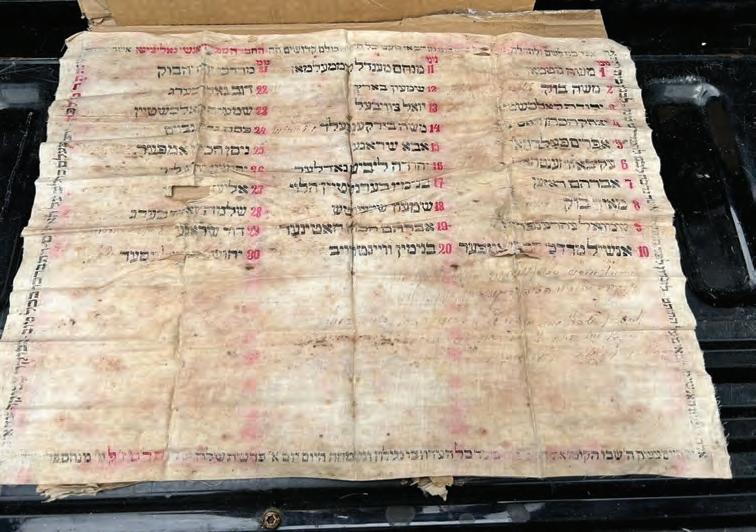
Salisbury said she reached out to McKeesport police, who referred the matter to Allegheny County.
The district attorney’s office said the case was still in the “investigative” stage.
Eric Lidji, director of the Rauh Jewish History Program & Archives at the Heinz History Center, said he learned about the document “late last year” after receiving a link to the listed item.
Seeing photographs of the manuscript
Arizona University and formerly served as assistant director of Goucher Hillel and advocacy coordinator for Hillel Ontario.
Before moving to Pittsburgh, VanderStoep helped found Baltimore Area Jewish Feminists.
The group, she said, “combats the intersection of sexism and antisemitism through state and grassroots advocacy.”
When a position at Pittsburgh’s Federation opened, VanderStoep and Regan gave Pittsburgh some thought.
“The job sounded amazing, and the community sounded absolutely amazing,” VanderStoep said.
The couple said they admire the success of other local Jewish groups, including Chabad Young Professionals and Federation’s Young Adult Division, that provide young residents opportunities for engagement.
“Our goal is to complement what people are already doing, not to compete,” VanderStoep said.
Regan, who after hosting NPR’s “All Things Considered” for Arizona Public Radio went on to teach religious school at Temple Isaiah in Fulton, Maryland, and serve as marketing director for Har Sinai-Oheb Shalom Congregation in Baltimore, said he and VanderStoep are looking forward to connecting with new peers and conveying that “there’s ways to do Jewish meaningfully — that Judaism is something for every moment of your life, and that includes this moment.” PJC
Adam Reinherz can be reached at areinherz@pittsburghjewishchronicle.org.
didn’t raise any concern about whether the document was stolen; instead, Lidji thought about the price.
“There’s no way we could afford $9,500,” he said.
Based on the seller’s photos, Lidji recognized that the names listed were of those who contributed to a building fund for Anshe Sfard Galitzin, a congregation formed around 1897. The document also included a date, “Yom Echad B’Parshat Shelach,” which corresponded to the
cornerstone laying on June 2, 1907. Lidji surmised the manuscript is “clearly not paper” and called the document “extremely rare.”
“I can’t think of anything that we have or anyone around here has that is preserved in this shape,” he added.
The circumstances surrounding the listing led Lidji to say he has no interest in “dragging someone’s reputation through the mud,” and that he’s reluctant to denigrate sellers, buyers or those involved in private acquisitions of historic Jewish items.
“You do have the right to make those choices,” he continued. Still, the Rauh Jewish Archives has a “strong agenda to allow things to go to places where the most people can use them for the most amount of time.”
There’s a calculation to be made, according to Lidji: When items aren’t publicly available, the historical record is a “teensy bit weaker so one or two people’s knowledge can be a bit stronger. My philosophy is for more people to have access to these things than fewer.”
Shortly after Salisbury’s post, and a related story by KDKA, the listing was removed from eBay.
In its place is a notice that “This listing was ended by the seller on Fri, Feb 28 at 9:11 AM because the item is no longer available.” PJC
Adam Reinherz can be reached at areinherz@pittsburghjewishchronicle.org.
By Tim Miller | Special to the Chronicle
In 1927, a community of Marranos was interviewed in the Portuguese town of Braganza. Descended from forced converts to Catholicism, over the centuries they developed their own idiosyncratic ways of observing Judaism in secret.
Among their rites was a prayer to Esther, whom the Marrano women of Braganza identified with as a Jewish woman caught in an alien culture. Joachim Prinz writes that when their neighbors knelt and prayed to the Catholic Madonna, the Marrano women’s thoughts “were with Esther.” Such is the power of the Purim story, and the struggle of the woman dubbed “Santa Esther.”
The story from which the holiday of Purim originates is also — depending on who you ask — closer to comedy, satire, fairy tale and burlesque. But the ability of a Jewish woman to enter a royal court and use her position to save her people from annihilation might be the kind of desperate fantasy that Jews in all times have desired. Perhaps it is our discomfort with this fact that allows us to also turn the story into a farce and an excuse to party.

The world is a stage It should come as no surprise that the Purim story — set in a royal palace and filled with intrigue, secret identities and no small amount of adult themes — has a long tradition in the theater. In the Venice Ghetto in 1558, a Purim play was put on by the Jews there. Based on a script by the Marrano


poet (and translator of Petrarch) Salamone Usque, Cecil Roth writes that it was such a success that the play was performed publicly the next year “before a select company of Venetian nobility and gentry.”
Irving Howe writes that centuries later, and even as the theater was looked at suspiciously in the Diaspora, the importance of
Purim to the development of Yiddish theater cannot be overstated. At first, the general permissiveness of the holiday resulted in improvised “comic-heroic” performances; in time, Howe writes, and by the mid-19th century, “groups of minstrels, acrobats, and singers began to wander from shtetl to shtetl, half-welcomed and half-scorned as ragamuffins of the culture.” Try as the religious or czarist authorities might, the Purim shpiel was here to stay.
Purim and Pesach
One of the earliest Reform congregations in America was Beth Elohim in Charleston, South Carolina. Their prayerbook, compiled around 1825, included no prayers for Chanukah or Purim. Indeed, the congregation explicitly stated that most of what is now taken for granted on Purim, including attendance by children under the age of 5, “is most strictly prohibited.” By the late 20th century, though, Purim had found its place (along with Chanukah and Pesach) as among the most recognized Jewish holidays, complete with community outreach and bags of shalach manot
Ruth Rubin, in her collection of Yiddish folk songs, also points out the obvious connection of Purim with the holiday that follows soon after, Pesach. One song, which
Submit calendar items on the Chronicle’s website, pittsburghjewishchronicle.org. Submissions also will be included in print. Events will run in the print edition beginning one month prior to the date as space allows. The deadline for submissions is Friday, noon.
FRIDAY, MARCH 14
Join Chabad of the South Hills for Purim in the Palace, an animated Megillah reading and royal Purim feast. Create your own magic potion and enchanted edible apples. 5 p.m. Adults $18; children $12; family max $54. 1701 McFarland Road. chabadsh.com/purim.
Celebrate Purim and join Chabad of Squirrel Hill for its Purim Feast. Enjoy a Megillah reading, music, crafts, entertainment and a Shabbat-style dinner. 5 p.m. $18/adult, $10/child. 1700 Beechwood Blvd. chabadpgh.com/purimfest.
SATURDAY, MARCH 15
Tree of Life Congregation invites you to Casino Night. The evening will be filled with casino games, light bites, drinks and great company. There will be blackjack tables, a roulette wheel and craps table. Be sure to bid on wonderful ra e and silent auction items. Dealers on site to teach you any game you want to try. Bronze level $25; silver level $50; gold level $75. 7:30 p.m. Rodef Shalom’s Freehof Hall. treeoflifepgh.org.
SUNDAYS, MARCH 16–JULY 27
Join Chabad of Squirrel Hill for its Men’s Tefillin Club. Services and tefillin are followed by a delicious breakfast and engaging discussions on current events. 8:30 a.m. 1700 Beechwood Blvd. chabadpgh.com.
MONDAYS, MARCH 17–JULY 21
Join the 10.27 Healing Partnership for Roll for Insight: Community-Building Role-playing Games Meet every other week to connect and grow with new friends through playing tabletop role-playing games designed to inspire emotional depth. They will use RPGs to explore the intersection of identity, emotional resiliency and games, to fight isolation and disconnection and to meet new people and form friendships. Free. No experience required. 16 and up. 5:30 p.m. Jewish Community Ketner, 5738 Forbes Ave. 1027healingpartnership.org/rpg-club.
MONDAYS, MARCH 17–JULY 28
Join Congregation Beth Shalom for a weekly Talmud study. 9:15 a.m. For more information, visit bethshalompgh.org.
Join Temple Sinai for an evening of mahjong every Monday (except holidays). Whether you are just starting out or have years of experience, you are sure to enjoy the camaraderie and good times as you make new friends or cherish moments with longtime pals. All are welcome. Winners will be awarded Giant Eagle gift cards. All players should

have their own mahjong cards. Contact Susan Cohen at susan_k_cohen@yahoo.com if you have questions. $5. templesinaipgh.org.
WEDNESDAYS, MARCH 19–JULY 29
Temple Sinai’s Rabbi Daniel Fellman presents a weekly Parshat/Torahportionclass on site and online. Call 412-421-9715 for more information and the Zoom link.
Bring the parashah alive and make it personally relevant and meaningful with Rabbi Mark Goodman in this weekly ParashahDiscussion: Life & Text 12:15 p.m. For more information, visit bethshalompgh. org/life-text.
FRIDAY, MARCH 21
Join Rodef Shalom’s Cantor Toby Glaser for a 20s & 30s Kabbalat Shabbat. Get to know other young Jewish professionals and close out the week with apps, wine and great company. 7 p.m. Free. Registration required. rodefshalom.org/ lateshabbat.
TUESDAY, MARCH 25
Sarah Abrevaya Stein presents Family Papers: A Sephardic Journey Through the Twentieth Century, sharing her award-winning research on the Levy family and their displacement from Salonica, Greece, to cities around the globe. Free. 5:30 p.m. calendar.pitt.edu/event/family-papers-a-sephardicjourney-through-the-twentieth-century.
WEDNESDAY, MARCH 26
Congregation Beth Shalom is pleased to announce that Michael Solomonov and Steven Cook will present their book “Zahav Home.” 7:30 p.m. bethshalompgh.org/march-2025.
THURSDAY, MARCH 27
Join Jewish Federation of Greater Pittsburgh’s YAD Philanthropy for Free Throws & Field Goals Sports Trivia Night, its annual fundraising event with a sporty twist. Will your team come out on top and win the grand prize? Register now and find out. Open to young adults ages 22-45. Early Bird: $25/person (ends March 17). General admission: $36/person. 7 p.m. PNC Park, 200 W General Robinson Street. jewishpgh.org/event/free-throws.
SUNDAY, MARCH 30
Join Chabad of Squirrel Hill for Jewish Gems, an afternoon of jewelry making and snippets of inspiration for women and girls. 1:30 p.m. $15/ person. 1700 Beechwood Blvd. chabadpgh.com /jewelry.
SATURDAY, APRIL 5
Families with young children are invited to spend Shabbat morning with Rodef Shalom at Shabbat with You. Drop in for a light breakfast, play date, sing-along with Cantor Toby and a Shabbat activity with Family Center Director Ellie Feibus. 9 a.m. $5 per family. 4905 Fifth Ave. rodefshalom.org/ shabbatwithyou. PJC
The Pittsburgh Jewish Chronicle invites you to join the Chronicle Book Club for its May 4 discussion of “Jews Don’t Count,” by David Baddiel. From Amazon.com: “‘Jews Don’t Count’ is a book for people who consider themselves on the right side of history. People fighting the good fight against homophobia, disablism, transphobia and, particularly, racism. People, possibly, like you.
"It is the comedian and writer David Baddiel’s contention that one type of racism has been left out of this fight. In his unique combination of close reasoning, polemic, personal experience and jokes, Baddiel argues that those who think of themselves as on the right side of history have often ignored the history of anti-Semitism He outlines why and how, in a time of intensely heightened awareness of minorities, Jews don’t count as a real minority: and why they should.”
Your hosts
Toby Tabachnick, Chronicle editor
David Rullo, Chronicle senior staff writer
How it works
We will meet on Zoom on Sunday, May 4, at 1 p.m.
What to do
Buy: “Jews Don’t Count.” It is available at some area Barnes and Noble stores and from online retailers, including Amazon.
It is also available through the Carnegie Library system.
Email: Contact us at drullo@pittsburghjewishchronicle.org, and write “Chronicle Book Club” in the subject line. We will send you a Zoom link for the discussion meeting. PJC
— Toby Tabachnick


By Eric Lidji | Special to the Chronicle
This is the final installment in a threepart series.
The Drama Group at Congregation
Beth Shalom produced two performances of “The Dybbuk” in December 1984 under the direction of Dr. Ze’ev Raviv. Raviv had recently come to Pittsburgh from Boston to serve as education director of Beth Shalom.
Raviv was born in a Polish shtetl in 1924 and made aliyah a decade later. His entire village was massacred early in the Holocaust. He got hooked on drama attending Habima productions. After serving in the War of Independence in 1948, he studied directing at the Yale School of Drama. He used “The Dybbuk” as his senior thesis and later directed five productions of the play. “Why do I keep coming back to this play?” he told the Chronicle. “All I can say is that the play fills me with awe. The theme of love, and the transcendence of the two lovers — something just drives me to do it again.”

The program for the 1993 production of “The Dybbuk” at the Pittsburgh Public Theater features illustrations by local artist Ilene
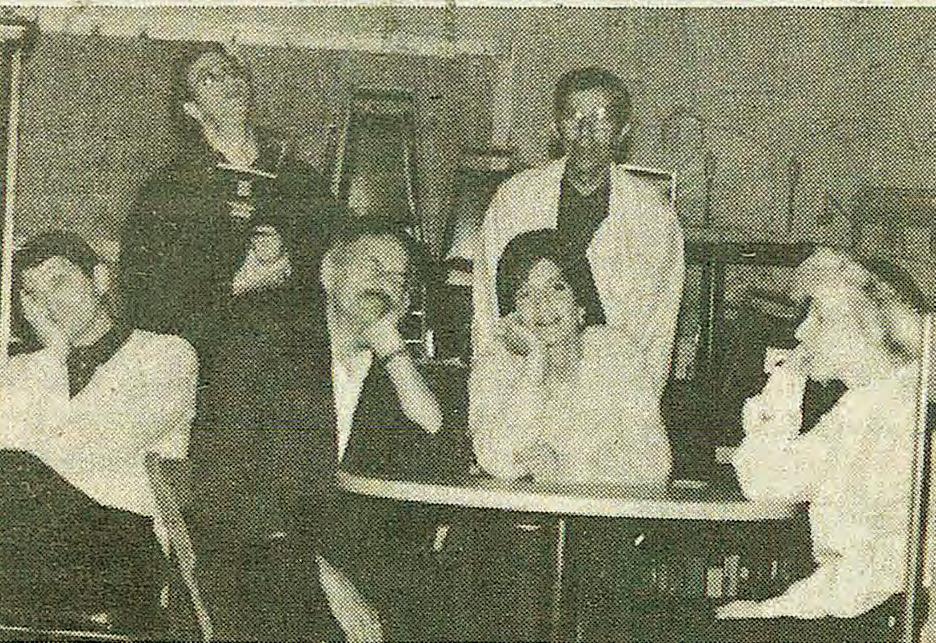
By the late 1970s, Raviv was mostly using his theater background to advance Jewish education. He wanted American Jews to view their cultural heritage as a gift to all humanity, as art with universal appeal, and not only as a communal treasure illuminating the Jewish experience. The troupe at Beth Shalom initially resisted, Raviv said. “Slowly, they began to believe me, that it is a beautiful and unusual play, full of life.”
elaborate sets, technically complex scenes and nearly 60 costumes.
Edward Gilbert chose “The Dybbuk” for his first play as artistic director of the Pittsburgh


Like the community production at the Y Playhouse in the early 1930s, Gilbert’s version of “The Dybbuk” was massive and ambitious. It had 23 actors playing more than 50 roles, plus


Friday, Saturday and Sunday March 21st -23rd from 10am to 2pm

Friday 3/21
Coffee & Conversation
Stop by for a fresh brewed cup of coffee and learn about the different types of services offered through personal care communities.

Saturday 3/22







10 am Asset Protection: Planning For Your Future
Presentation by Attorney Kathleen Schneider Attorney at Law and Certified Public Accountant.
Senior Living at Forest Hills 107 Fall Run Road, Pittsburgh, PA 15221 I 412.244.9901 junipercommunities.com ForestHills.Sales@JuniperCommunities.com

If you read old newspaper coverage of the production, you’ll find advertisements nearby for Spielberg’s “Schindler’s List.” The play and the movie opened the same day.
Please see Dybbuk, page 11












Sunday 3/23
Free Breakfast
Stop by for a delicious chef prepared breakfast – RSVP’s encouraged
Squirrel Hill’s congresswoman, Rep. Summer Lee, co-sponsored a series of resolutions this week aiming to prohibit the export of certain defense weapons to Israel. Along with fellow “Squad” members Rashida Tlaib of Michigan, Alexandria Ocasio-Cortez of New York, Ilhan Omar of Minnestota, and nine other Democrats, Lee seeks to prohibit the United States from sending various military aid to Israel, including air-to-ground missiles

as well as “support and test equipment; integration and test support; spare and repair parts; software delivery and support; publications nd technical documentation; personnel training and training equipment; U.S. Government and contractor engineering; technical and logistics support services; storage; and other related elements of logistics and program support.”
L ee called for a cease-fire in Israel’s defensive war against the terrorist organization Hamas shortly after its Oct. 7, 2023, invasion of the Jewish state. When the
current cease-fire/hostage deal was announced in January, Lee weighed in with a statement that acknowledged only Palestinian trauma, was silent as to Israeli suffering and called for an arms embargo against Israel.
In a Jan. 17 post on X (formerly Twitter), Lee did not mention Hamas and its attack that ignited the war, instead laying the blame for the conflict entirely on the Jewish state and referring to Israel’s response as a “genocide.” PJC
— Toby Tabachnick
By Ben Sales | JTA
Immigration officers arrested a recent Columbia University graduate over his role in pro-Palestinian activism, a dramatic escalation of the Trump adminis tration’s offensive against students protesting Israel at the school.
The detention last weekend of Mahmoud Khalil, a Palestinian who is in the country legally and holds a green card, has elicited sharp reactions from politicians and activists. Pro-Israel groups and figures largely praised the arrest as a signal that the White House is taking campus antisemitism and support for terrorism seriously. Progressive and pro-Palestinian groups, meanwhile, are decrying the arrest as a dangerous precedent and an assault on freedom of speech and assembly.
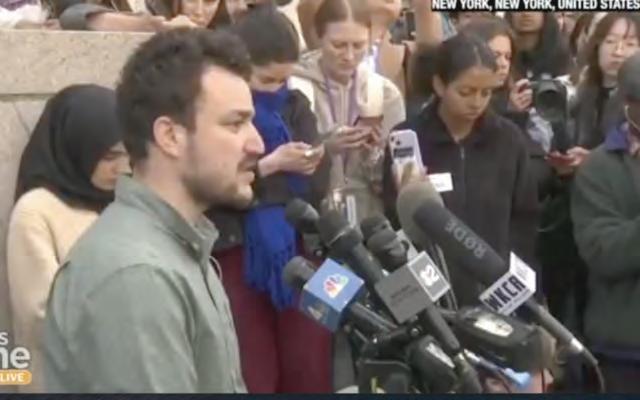
Khalil, according to a Department of Homeland Security statement issued Sunday night, was arrested by Immigration and Customs Enforcement officers earlier in the day. News reports said he was taken into custody at his apartment in a Columbiaowned building, and that his wife, who is eight months pregnant, was also threatened with arrest. His lawyer said in a statement that she did not know his whereabouts.
Secretary of State Marco Rubio tweeted that the U.S. government intends to deport Khalil.
“We will be revoking the visas and/or green cards of Hamas supporters in America so they can be deported,” he wrote on Sunday. He did not specify what law, if any, Khalil is accused of violating.
The arrest is the highest-profile instance, so far, of the Trump administration following through on its vow to deport student activists whom it accuses of supporting terrorism — a pledge Trump made on the campaign trail and included in a January executive order.
Khalil, who recently graduated from Columbia’s School of International and Public Affairs, is a leader of Columbia University Apartheid Divest, the vociferously anti-Israel group leading campus pro-Palestinian demonstrations.
He has acted as a spokesperson for the group, which has previously called for
“armed resistance,” and was a leader of last year’s encampment protest. He has remained involved following his graduation, taking part in a pro-Palestinian demonstration last week at Barnard College, the women’s school affiliated with Columbia.
The DHS statement said Khalil’s arrest occurred “in support of President Trump’s executive orders prohibiting anti-Semitism” and accused Khalil of supporting terrorism.
“Khalil led activities aligned to Hamas, a designated terrorist organization,” the statement said. “ICE and the Department of State are committed to enforcing President Trump’s executive orders and to protecting U.S. national security.”
Jewish groups were among the many voices to swiftly weigh in on Khalil’s arrest.
Bend the Arc, a progressive Jewish group that spoke out in defense of the encampment movement, tweeted that President Donald Trump was playing on fears of antisemitism in order to pursue an anti-democratic agenda.
“The White House’s authoritarian actions are being falsely done in our name as Jews, by a President and politicians who actively use antisemitism and do not speak for Jews,” the group tweeted. “We’ve been afraid this day would come since campus protests began. Free speech and education are pillars of our democracy, and a healthy democracy is what keeps Jews safest.”
The Anti-Defamation League, an
antisemitism watchdog that has criticized Columbia’s response to pro-Palestinian activism, praised the arrest while calling for immigration law to be followed.
“We appreciate the Trump Administration’s broad, bold set of efforts to counter campus antisemitism — and this action further illustrates that resolve by holding alleged perpetrators responsible for their actions,” the group’s statement said. “Obviously, any deportation action or revocation of a Green Card or visa must be undertaken in alignment with required due process protections. We also hope that this action serves as a deterrent to others who might consider breaking the law on college campuses or anywhere.”
The statement immediately elicited criticism from progressive Jews who said the ADL was abandoning its values.
“BRB, checking the history books to find out whether ‘tyrant starts redefining peoples’ citizenship status’ usually ends well for the Jews,” tweeted Leah Goldberg, a co-founder of Indivisible, in an allusion to Hitler’s decision to strip citizenship from many Jewish Germans in the 1930s.
More than 700,000 people signed a petition opposing Khalil’s arrest in the hours after it took place. The Council on AmericanIslamic Relations called the arrest “a blatant attack on the First Amendment’s guarantee of free speech, immigration laws, and the very humanity of Palestinians.” Democratic Rep. Pramila Jayapal, a prominent progressive,
tweeted, “Deporting legal residents solely for expressing their political opinions is a violation of free speech rights.”
Khalil’s arrest comes days after the Trump administration froze $400 million of grants to Columbia as a response to how it has handled campus antisemitism. And it comes weeks after Barnard expelled two students for disrupting an Israeli history class and handed out fliers showing a boot stomping on a Star of David.
The arrest comes shortly after reports that the Trump administration was using artificial intelligence to find and deport students who support Hamas, and that ICE had already revoked one activist’s visa. On Friday, an account on X dedicated to identifying anti-Israel and antisemitic activists at the school posted about Khalil and called for Rubio to take action against him.
“Mahmoud Khalil, the foreign student who is one of the leading agitators on campus, is still causing trouble,” read the post by an account called Documenting Jew Hatred on Campus at Columbia U. “He seems to be present at every encampment and every sit-in or building takeover.”
Other pro-Israel activists praised the arrest. Shai Davidai, an Israeli Columbia professor who has outspokenly opposed the school’s response to anti-Israel activism, tweeted, “To be clear: Mahmoud Khalil was detained because he broke the law and his green card conditions.”
The Columbia Jewish Alumni Association, created during the Israel-Hamas war, tweeted that it was pleased that Khalil was reportedly losing his green card. “A green card is a privilege that millions wait years for. So is studying a @Columbia,” the group wrote. “Khalil threw them away. His actions prove he neither respects nor deserves the shot he was given. No one should feel sorry for him.”
Betar US, a militant right-wing proIsrael group that has recommended names of people to deport to the Trump administration, praised the arrest and called for more like it.
“We commend @realDonaldTrump for grabbing jihadi Mohammad Khalil!” the group tweeted. “Many many more to go Mr President. We will keep bringing evidence and will continue to assist @ICEgov nationwide.” PJC
Trump administration cancels $400M of grants to Columbia U over campus antisemitism
The Trump administration has canceled $400 million worth of grants to Columbia University, following through on threats to pull funding from the school over objections to campus antisemitism, JTA reported.
The grants came from the Department of Health and Human Services, which announced the cuts on Friday, as well as the Departments of Justice and Education and the General Services Administration. The statement warned that more cuts could follow.
“Since October 7, Jewish students have faced relentless violence, intimidation, and anti-Semitic harassment on their campuses –only to be ignored by those who are supposed to protect them,” said Linda McMahon, the education secretary. “For too long, Columbia has abandoned that obligation to Jewish students studying on its campus.”
The announcement did not detail which grants were canceled, nor what they funded, but most federal grants to universities tend to support science research. According to the Columbia Spectator, $1.3 billion of the university’s 2024 operating budget came from federal grants. Federal grant funding to Columbia, covering multiple years, totals more than $5 billion, the government statement said.
Columbia responded in a statement to multiple outlets that it “pledge[s] to work with
the federal government to restore Columbia’s federal funding.”
The statement added, “We take Columbia’s legal obligations seriously and understand how serious this announcement is and are committed to combatting antisemitism and ensuring the safety and wellbeing of our students, faculty, and staff.”
Last week, nine people were arrested at a pro-Palestinian protest featuring pro-Hamas materials at Barnard College, which is affiliated with Columbia. Several of the people arrested were students at Columbia.
Pentagon official posted neoNazi talking point about Jewish lynching victim Leo Frank last year
Kingsley Wilson, appointed in January to be deputy press secretary at the Pentagon, l ast year tweeted a neo-Nazi talking point about Jewish lynching victim Leo Frank, JTA reported.
The post came amid a flood of far-right social media content by the Trump administration appointee, who previously worked at an organization founded by the architect of Project 2025, the Christian conservative blueprint for a Trump White House. Many of Wilson’s posts, which remain online, reflect antisemitic conspiracy theories.
The one about Frank has resurged in recent years. Frank was a factory manager in Georgia who was convicted on thin evidence of killing a 13-year-old girl, Mary Phagan, and was sentenced to death. When his sentence was commuted to life in prison, a mob lynched him. The 1915 lynching spurred the creation
March 17, 1992 — Knesset passes basic law on human dignity
of the Anti-Defamation League and is widely seen as antisemitic.
Neo-Nazis have long claimed that Frank was guilty and that the consensus that he was framed is evidence of Jewish control of the media. Those claims received publicity in 2023 when the National Socialist Movement, a neo-Nazi group, protested outside previews of “Parade,” a Broadway musical about Frank’s lynching. The protesters criticized the ADL and their banner read, “Leo frankly was a pedo.”
In August 2024, Wilson posted the same sentiments on X, above a post by the ADL commemorating Frank’s lynching.
“Leo Frank raped & murdered a 13-year-old girl,” she wrote. “He also tried to frame a Black man for his crime. The ADL turned off the comments because they want to gaslight you.”
Five months later, the day after Donald Trump’s inauguration as president, she was appointed deputy Pentagon press secretary. Previously, she worked in communications for the Center for Renewing America, a pro-Trump group founded by Russel Vought, one of the architects of Project 2025. Vought now serves as director of the United States Office of Management and Budget, which is executing an effort to slash the federal budget.
Seth Mandel, senior editor of the Jewish conservative magazine Commentary, called the Frank lynching “a foundational blood libel that is inseverable from the violence it provokes. This is the way a pogromist talks, and she’s now deputy press secretary in Trump’s DoD.”
Last April, at the height of the pro-Palestinian
encampment movement that many Jewish college students said created a hostile atmosphere on campus, Wilson posted a video criticizing House Speaker Mike Johnson, a Republican, for going to Columbia University to oppose the encampment.
Jewish editor in Florida says he was fired after running cartoon about Gaza
A Florida editor says he was fired by his local paper, part of a national network, after he ran a cartoon that was critical of the death toll in the war in Gaza, JTA reported.
Tony Doris says he was fired as editorial page editor at the Palm Beach Post in February after the paper, owned by the company Gannett, got blowback about the cartoon from local Jewish leaders.
The cartoon, which ran in January, showed Israeli soldiers helping a freed hostage exit Gaza — by walking over a pile of bodies labeled “over 40 thousand Palestinians killed.”
Doris’ firing was first reported by Stet News, a nonprofit newsroom covering Palm Beach County. Doris told Stet that he saw the cartoon as antiwar.
But the Jewish Federation of Palm Beach County bought a full-page ad in the Post decrying the cartoon as “a modern-day blood libel” and saying, “Hate speech turns into hate crimes. Journalism must inform, not incite.”
Doris said he was subsequently fired. He said he had been told his work violated unspecified company policies. PJC
Compiled by Toby Tabachnick
Items are provided by the Center for Israel Education (israeled.org), where you can find more details.
March 14, 1972 — Black Panthers steal milk
Israel’s Black Panthers, who seek equality for Sephardi and Mizrahi Jews, steal crates of milk meant for wealthy Jerusalem neighborhoods and hand them out across poor neighborhoods to protest poverty, angering Prime Minister Golda Meir.

March 15, 1939 — Irgun radio begins broadcasting
Kol Tzion HaLokhemet (“Voice of the Fighting Zion”), the un derground radio network operated by the Irgun, broadcasts for the first time. Highlighting news the British would censor, the network operates until independence in 1948.
March 16, 1722 — Jewish Berliners receive new constitution
Berlin’s Jewish community is reorganized under a new constitution after Prussian authorities issue statutes regulating the community. The Aeltesten Reglement reinforces Jewish communal autonomy and collective responsibility.
The Knesset enacts the Basic Law: Human Dignity and Liberty. Concerns about conflicts with Jewish law had long blocked such a statement of support for core human rights among the laws that operate as a constitution.
March 18, 1975 — Ford reassesses U.S.-Israel relationship
The United States begins “reassessing” its relationship with Israel because President Gerald Ford and Secretary of State Henry Kissinger are frustrated over Israel’s reluctance to withdraw from the Sinai without security guarantees.
March 19, 2012 — ‘Photoshop Law’ passes
In response to the death of a model who weighed 60 pounds, the Knesset adopts the “Photoshop Law,” setting a minimum body-mass index for adult models and clear notification of any alteration or digital manipulation of an image.
March 20, 1899 — Jewish Colonial Trust is incorporated



The Jewish Colonial Trust, proposed at the First Zionist Congress and approved at the Second Zionist Congress, is incorporated as a central development bank to support the Jewish national home’s growth. PJC

Tree of Life:
Continued from page 1
That’s set to change in late August or early September, Zawatsky said. The look of the project, though, will be different than originally planned.
“We’re working on a building with a smaller footprint than the original design and somewhat more simplified but still very beautiful,” she said.
The organization has raised just under $41 million, according to Zawatsky.
“We worked very closely with Studio Libeskind to have a redesign that is appropriate for the programmatic use,” she said, “and to have a spectacular Libeskind building that was right-sized in terms of size, design, cost and pragmatic use.”
Daniel Libeskind, who was the master planner of the World Trade Center site, is the lead architect on the project.
Tree of Life’s new building, Zawatsky said, will still be home to Tree of Life Congregation, one of the three synagogues — along with New Light Congregation and Congregation Dor Hadash — attacked on Oct. 27, 2018, as well as a memorial to the victims, a museum, an education center and
Referendum:
Continued from page 1
Coalition worked together to assemble more than 200 volunteers to review every signature.
“The invalid signatures included 1,076 duplicates (including circulators who signed their own pages multiple times), 3,305 signers residing outside of Pittsburgh, and more than 2,800 signers not registered as voters in the region (if at all),” Beacon Coalition officials said. “Notably, Beacon Coalition also discovered that more than 6,000 signatures were gathered by canvassers who are not residents of Pittsburgh.”
In a press conference following the hearing, Heisler said that the since the Oct. 7, 2023, Hamas attack in Israel the Jewish community has faced “consistent attacks and threats to their physical safety and well-being.”
a home for the Institute for Countering Hate and Antisemitism.
The design will be premiered at the launch of a traveling exhibit, “Lessons from the Tree of Life: Lighting the Path Forward,” running from March 27 through April 25 at the University of Pittsburgh.
27, 2018, and walks you through that, and then what we’re going to build, so you can see the next chapter of the Tree of Life reimagined,” Zawatsky said.
The exhibition, she said, will answer questions about plans for the new building and the types of programs, events and
“We’re doing something incredibly unique. There will be a memorial on the site to each of the 11 murdered victims and we’re inviting people to go back in and celebrate Jewish life at a place of the greatest act of violent antisemitism in America.”
–CAROLE ZAWATSKY
days immediately following the shooting will be included as part of the exhibition.
Zawatsky said the items were “left at the Tree of Life in solidarity and shared mourning with the Jewish community of Pittsburgh.”
And while the new exhibit and design might seem a long time coming, Zawatsky is quick to note that it took nearly 13 years to complete the 9/11 Museum and Memorial, and even longer — a generation — for the United States Holocaust Memorial Museum to open.
“We’re doing something incredibly unique,” she said. “There will be a memorial on the site to each of the 11 murdered victims and we’re inviting people to go back in and celebrate Jewish life at a place of the greatest act of violent antisemitism in America.”
The time period between the attack and the construction of the new building, Zawatsky said, has allowed Tree of Life the opportunity to create what is best for the community, the families of the victims and survivors.
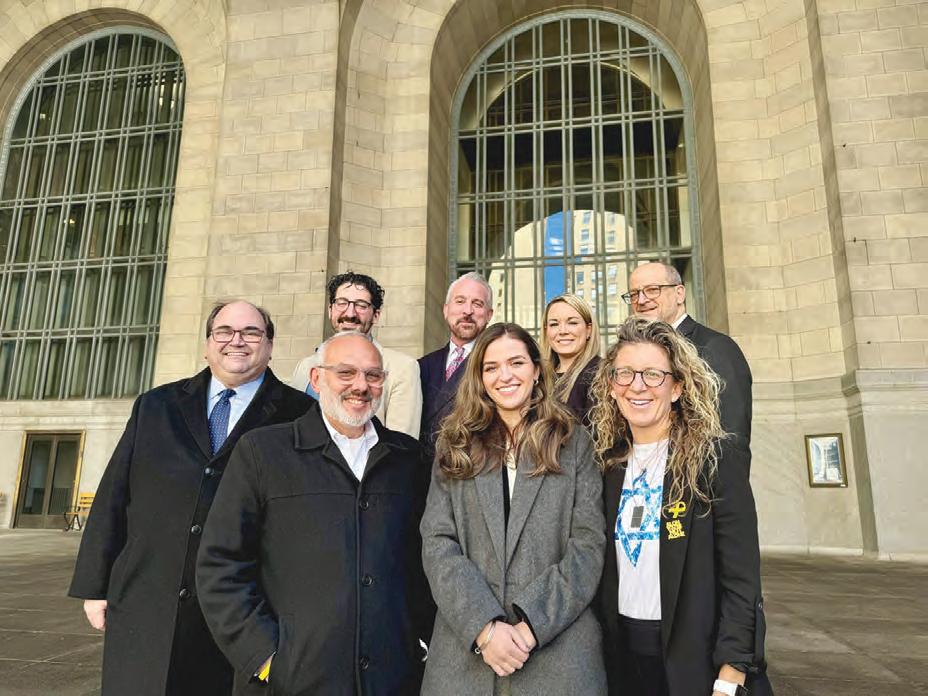
“I will always stand with my Jewish neighbors,” Heisler said.
The controller noted that the referendum, if passed, would have potentially “severely restricted and/or limited entirely the city’s ability to effectively operate.”
Heisler noted that the referendum would have amended the Home Rule Charter in ways that would have impacted procurement practices, city spending, city investments, city finances and the benefits guaranteed to city retirees.
“I firmly believe this is not the forum to determine complex matters of international law,” Heisler said.
Jeff Finkelstein, Federation president and CEO, said that, if passed, the referendum would have made it more difficult for the city to care for its residents.
“I don’t understand why a group of people who live in the city of Pittsburgh would do things that would deliberately hurt the residents of Pittsburgh,” he said. “That’s what this referendum was going to do.”
Responding to a question about whether the referendum was antisemitic, Finkelstein said it met the International Holocaust Remembrance Alliance’s definition of antisemitism because it would have held Israel to a different standard than any other country.
“That’s why we, as a Jewish community, will always fight back against things that demonize the state of Israel,” he said.
“This is yet another decisive victory for our Jewish community, for local voters and for the City of Pittsburgh,” Federation posted on its website following the stipulation.
Julie Paris, StandWithUs’ Mid-Atlantic regional director, said attacks against the Jewish community “are often seen as the canaries in the coal mine.”
“When the Jewish community is attacked, the rest of the community comes next,” she said. “Those who are proponents of this anti-Israel referendum make life more difficult for those of us looking to live here, to function in our daily lives and
have access to live-saving technology.”
Jeremy Kazzaz, Beacon Coalition’s executive director, said Not On Our Dime’s repeated legal defeats underscore “the lack of genuine public support for these divisive tactics.”
Kazzaz put some of the blame squarely on the back of Pittsburgh May Ed Gainey, whose inaction, he said, “allowed this destructive initiative to persist, despite clear evidence that it threatens the well-being of all Pittsburgh residents.”
“Moreover, the Mayor refused to sign City Council Ordinance 1426, a measure passed overwhelmingly (6-2) by City Council to protect Pittsburgh from being harmed by this effort and similar abuses of the Home Rule Charter amendment process. By twice refusing to take action against discriminatory measures, Mayor Gainey empowers this extremist group to continue to target our city and its residents,” Kazzaz said in an emailed statement.
Ben Case, a leader of Not On Our Dime,
More information about the exhibit can be found at thetreeoflife.org/ lessons-from-the-tree-of-life. PJC
David Rullo can be reached at drullo@ pittsburghjewishchronicle.org.
said that the fact that his organization was able to gather thousands of signatures demonstrated “Pittsburghers want to vote on this issue.”
“That doesn’t go away just because the lawyers of the Jewish Federation were able to use legal technicalities to invalidate enough signatures from registered Pittsburgh voters to push us off the ballot — doesn’t make this issue go away,” he said.
Not On Our Dime, he said, is attempting to find a democratic avenue for “an issue a lot of people care deeply about.”
Federation, he said, denied citizens that opportunity.
Case said he found Federation’s claim of a “victory” for the Jewish community “deeply offensive.”
“It’s specifically offensive to members of the Pittsburgh Jewish community who organized for this referendum and who signed this petition like myself,” he said. “Federation likes to say it speaks for the entire Jewish community. It does not, especially on this issue.”
Following the hearing, several antiIsrael organizations, including Students for Justice in Palestine at the University of Pittsburgh and Pitt Divest From Apartheid, reposted an antifa group’s Instagram screed against Heisler, calling her a “Zionist who has used her position as City Controller to promote pro-Israel policy and crush pro-Palestine initiatives.”
“Rachel Heisler is unfit for her position as a City Controller,” Steel City Antifascist League wrote. “She is clearly incapable of separating her personal belief in Zionism from her work.”
Federation has reserved its right to seek legal fees from Not On Our Dime and the Project For Responsive Democracy. PJC
David Rullo can be reached at drullo@ pittsburghjewishchronicle.org. Toby Tabachnick can be reached at ttabachnick@pittsburgh jewishchronicle.org.
Purim:
Continued from page 5
takes place in a bakery just after Purim, declares (with excitement or exasperation?), “No sooner is Purim past,/Than the preparations for the matso baking gets under way.”
Too much fun
Before modern times especially, the reaction of Christians to Purim have been unsurprisingly negative. Stefan Reif writes that Byzantine authorities “resented the use of the biblical book and the Purim festivities as an indulgence in what they regarded as Jewish chauvinism and anti-Christian behavior.” At its most dangerous, the ignorance of Christians with the Purim story and its attendant celebrations led to accusations that the mock execution of Haman was, actually, a reenactment of the crucifixion of Jesus.
Such accusations are only a step away
Dybbuk:
Continued from page 7
“I have been at some pains to say to the actors that this is not a Holocaust play,” Gilbert told the Post-Gazette. “This is not about the suffering of the Jews. Everything gets colored by that. I’d be the last person to underplay the hardness. The main reality of this is poverty.” He preferred to describe the play as “a strong story dealing with justice and responsibility, mental illness and spirituality.” In a review, Christopher Rawson described the tone of the production as “sweetly elegiac and reverent, sorrowful and lyrical.”
It is overwhelming to situate the 1934 production alongside the 1993 production, each pushing aside the Holocaust in its own way to make space for a slice of Jewish life.
The most recent production of “The Dybbuk” was the Pittsburgh Jewish Music Festival’s’ 2013 production of Israeli composer Ofer Ben-Amots’ opera adaptation.
Aron Zelkowicz started the festival in 2003 to share accessible and overlooked Jewish classical music with the public. He felt that audiences were often unaware of the depth and breadth of authentic Jewish source material. “The Dybbuk” was a good example: a play that many recognized by name but few had actually seen performed.
“To me, the whole thing was a dreamscape,” Zelkowicz said. Here was the culture of the shtetl, refracted through its supernatural
from the blood libel, and as Simon Schama writes, as far back as the year 414, at the town of Inmestar near Antioch, a riot took place when Jews were accused of taking a Christian child for the purpose of a “Purim
persecution and of “Second Purims,” which were observed “to commemorate a deliverance from some danger or persecution.”
Jewish historian Jonathan Sarna writes of a family in Richmond, Virginia, in 1811 who,
found among the literary remains of the ascetic community at Qumran, the Dead Sea Scrolls. Later, the Tannaitic and Amoraic sages were not only uncomfortable with making the observance of Purim obligatory, but they also challenged the scroll of Esther’s place in the Tanakh. (Only in later midrash do they allow their imaginations to add to the comedy and the burlesque.)

killing.” In Muslim lands, Islamic law forbade the ostentatious display of either Judaism or Christianity, and no doubt a public festival like Purim was seen as immensely threatening. Jews remaining Jews was bad enough; Jews having a good time of it was even worse.
Yosef Hayim Yerushalmi describes just how important the scroll of Esther was for Jews living under Christian and Muslim control in the Middle Ages. The book became a model for contemporary chronicles of
after surviving a fire, instituted a second Purim in just this way. Similarly, Mark Cohen writes of the Jewish community of Cairo in 1524, and the difficulties they faced under a new governor there; this “Egyptian Purim” was commemorated up until the 1950s.
Where’s God in all this?
It is frequently pointed out that the scroll of Esther is the only biblical book not to mention God. This is no doubt the reason why it is also the only biblical book not

After all, a barely-avoided genocide being celebrated with costumes and drunkenness and jokes is itself a kind of celebration of life, a pious excess in which the children of survivors are the best symbols and are allowed to have the most fun. It also, perhaps, says something about Jewish humor as well, that the grimmest subject matter can be turned to farce, sexual innuendo, cross-dressing and the like. It is akin to Mel Brooks quipping, “Not only should we laugh about Hitler. We must laugh about him. Especially in Berlin.” PJC
Tim Miller is a freelance writer living in Pittsburgh.
to be with the living and deal with death that way.”
With that bold, simple change, Zelkowicz got to the heart of why this play has captivated this Jewish community and others for so long, through so many decades of change. It is a play insistent on life, regardless of the darkness falling around it.
In researching these articles, I felt a strong compulsion to read the play. I did, and I was captivated. I found myself reading it again and again on a loop for several weeks.
One central image sticks with me above all others: a gravestone belonging to a young couple that had been murdered on their wedding day in 1648 by Khmelnitsky.
The gravestone is not in a cemetery. It is in the town square, exactly where the act occurred. “The two of them were buried in the same grave so they could be together for all eternity,” Leah explains in a monologue. “And at every wedding, when people dance around their grave, their ghosts emerge and they participate in the joy of the newlyweds.”
She stands at the grave, with hands lifted, and says, “Holy bride and groom! I invite you to my wedding! Please come and stand at my side under the chuppah.” PJC
lore. To capture that dreaminess, he took an expansive approach to the chamber opera, adding spoken narration, musical interludes, a women chorale, a children’s choir, video installations, ballet dancers and puppets.
Zelkowicz also took the unusual step of changing the ending. Instead of passing over to the spirit world, the possessed Leah stays here. “It’s difficult dealing with death,” he explained, “but it’s more difficult
Eric Lidji is the director of the Rauh Jewish Archives at the Heinz History Center. He can be reached at rjarchives@heinzhistorycenter. org or 412-454-6406.






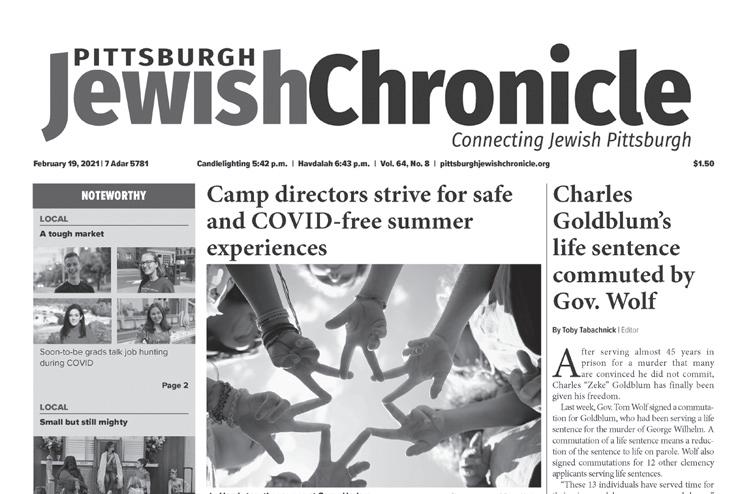
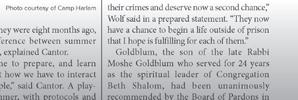
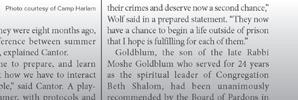




Jewish state and very likely furthered the surge of antisemitic activity in Pittsburgh.
There are heroes in our midst.
In the span of just six days, more than 200 volunteers spent countless hours poring over more than 21,000 signatures collected by an anti-Israel organization seeking to prohibit the City of Pittsburgh from doing business with the Jewish state, or with any entity doing business with Israel (see story on Page 1).
Not On Our Dime, and its fiscal sponsor The Project for Responsive Democracy, needed to collect 12,459 signatures of Pittsburgh residents registered to vote in order to get their anti-Israel referendum on the May ballot.
But community volunteers found that more than 12,000 of the 21,000 signatures submitted were defective. For example, there were more than 1,000 duplicates and more than 3,000 signers residing outside of the city.
More than 6,000 signatures were gathered by canvassers who were not even residents of Pittsburgh.
The referendum question, if passed, could have seriously harmed the city’s finances and disrupted its operations, including services related to health and safety. It would have contributed to a groundless vilification of the
After the volunteers’ work revealed that Not On Our Dime did not gather the requisite number of valid signatures, the anti-Israel group acknowledged its failings through a signed stipulation.
Federation of Greater Pittsburgh, including Jeff Finkelstein and Laura Cherner, and StandWithUs’ Julie Paris.
Pittsburgh is fortunate to have so many capable people who are committed to the well-being of our city and the safety of its Jewish constituents.
Pittsburgh is fortunate to have so many capable people who are committed to the well-being of our city and the safety of its Jewish constituents.
This was the second time Not On Our Dime has submitted thousands of invalid signatures in an attempt to force the city to boycott Israel and the second time it has come up short. It was also the second time community volunteers did the tedious and herculean work of reviewing those signatures, generously lending their time and energy to help quash an effort that was at best misguided and at worse motivated by hate. We applaud their dedication. We also applaud those who organized the signature review, especially Beacon Coalition leaders Rebecca Elhassid and Jeremy Kazzaz, as well as leaders of the Jewish

Courtroom 2 of Pittsburgh’s Municipal Court is a bit like Rick’s Café. A cross section of people enter to have their fate decided. They arrive early and bring whatever paperwork they think they’ll need. The lucky ones will be able to pay fines levied, make restitution or, if required, bail. And, like those who frequented the famous Casablanca café, the inhabitants of Courtroom 2 wait and wait and wait … .
On March 4, I awoke earlier than usual and fought my way through rush hour traffic to arrive at the courthouse before 8 a.m. I was there to observe the hearings scheduled for several people arrested during the illegal encampment at the University of Pittsburgh last summer. Those slated to appear claimed they

At the heart of Purim celebrations lies a simple yet profound act: giving food to others. But as with all acts of giving, mishloach manot is not as simple as it seems. This mitzvah, distinct from the requirement to give charity to the poor, presents an interesting social challenge: How do we give a package of food in a way that fosters joy rather than discomfort?
were peacefully protesting but were arrested for assaulting police officers and campus security. The courtroom was mostly empty but began to fill as the hour approached 9 a.m. It was obvious that, like surgery, many people are told to arrive at the same time and then have to wait til their case is called. Most of the people charged for their actions on Pitt’s campus didn’t arrive at 8 a.m.; in fact, many didn’t arrive until well after 9 a.m. When they, and their s upporters, entered the room they were easy to spot.
On one side of the room was a group of people, largely of color, many appearing to be poor. Some required interpreters. Their faces spoke of the concern and anxiety created by the reality of the situation. They were worried about the outcome of their cases. For some, it might have meant the difference between going home that day or being taken to jail.
In hushed tones, overworked public defenders spoke to their assigned clients. They asked if they could afford to pay bail or fines, offering to make some phone calls to try to pull
Giving “horizontally” is often more complicated than giving “vertically.” A gift that is too extravagant can leave the recipient feeling inadequate or pressured to reciprocate. A gift perceived as too modest can create disappointment. In this tension between giving and receiving, the wisdom of the Talmud offers deep insights, less about the technicalities of the mitzvah and more about the psychology of human relationships.
The Talmud (Megillah 7a) defines the mitzvah succinctly: One must send two portions of food to one friend and two gifts to two poor people.
The term manot (“portions”) is plural, requiring at least two portions of food.
They are not our only heroes. We also are grateful to those elected officials who stepped up to the plate to defeat the anti-Israel referendum effort. City Controller Rachael Heisler filed a court challenge as to legality of the anti-Israel ballot question. City Councilmember Erika Strassburger introduced two other referendums to put on the ballot, ultimately passed by the majority of City Council (Councilmembers Barb Warwick and Deb Gross voted against one of the measures), that would safeguard Pittsburgh from future attempts to prohibit it from doing business with Israel or those doing business with Israel.
together the required money if needed.
One lawyer told a defendant that charges would be dropped if they could afford to pay $300. The defendant said they didn’t have it. Asked how long it would take to pay it off, they said, “Probably six months.” The lawyer said she would make some calls and see if she could find money to help cover the fine.
In a separate corner of the courtroom — but a world away — sat the activists from the anti-Israel encampment. They were white, most appearing to be affluent, and wearing keffiyehs and masks. They held books about protesting and typed on laptops. It looked like this was nothing more than cosplay for these actors pretending to be radicals.
They spoke in jovial tones, often loudly. At one point, a court employee asked them to keep their voices down. The words and phrases they used were the same as those spoken in any social justice graduate class — oppression and oppressor, systematic trauma, racism.
On the other side of the room, the one where the consequences were real, the language was
However, contrary to common practice, these portions do not need to have different blessings. They can be two identical portions of the same food or two different foods of the same type. Furthermore, while one must give charity to two different people, mishloach manot requires sending it to only one friend.
Despite the mitzvah’s relatively modest baseline, many people exchange dozens of food gifts with family, friends and neighbors — sometimes going well beyond the letter and possibly the spirit of the law. This raises the question: Is the mitzvah about the food itself or something deeper?
Rabbi HaNasi, a wealthy leader, sends Rabbi Oshaya a Purim gift of a leg of veal and
Others contributed support with their voices.
“I strongly reject any attempt to boycott, divest or sanction Israel, through a referendum or otherwise,” Sen. John Fetterman told Jewish Insider. “It’s the electoral manifestation of antisemitism that’s escalated after 10/7. For the region of the Tree of Life [synagogue] massacre, it’s truly reprehensible to target the Jewish community and Israel.”
A spokesperson for Gov. Josh Shapiro, told Jewish Insider that Shapiro “has long opposed plans to boycott, divest, and sanction Israel, and he remains opposed to these efforts,” in reference to the proposed referendum.
We are disappointed and concerned that significant community resources — both time and money — had to be allocated to defeat an effort threatening the city’s ability to function. And we are frustrated that this had to happen twice.
We hope that local anti-Israel activists realize their campaigns to have Pittsburgh boycott the Jewish state — and essentially shut down the city — will not succeed. But if they have learned nothing from their two failed efforts, we implore city officials, including the mayor, to take the lead in challenging future attempts. PJC
different. Words like abuse, assault, rehabilitation and restitution were uttered, both when the defendants spoke to the court-appointed attorney they had just met and by the judge who was meting out justice.
One woman, a Black bus driver, recounted in tears an incident involving a defendant who didn’t show up for the hearing. She told the judge how he purposely undressed and sat down on the nearly empty bus before beginning to masturbate. The driver called the police and the man was arrested.
The encampment defendants didn’t raise an eyebrow or take note of the victim, or of any of those who appeared before the judge prior to their case being heard. They were too busy discussing the need to rage against the machine and tear down the systems of oppression.
The felony charges against the encampment defendants were withdrawn but the misdemeanor charges remain. PJC
David Rullo can be reached at drullo@ pittsburghjewishchronicle.org.
a jug of wine, a generous and respectable gift. Yet Rabbi Oshaya responds sharply, “You have fulfilled the mitzvah of giving gifts to the poor.”
In other words, while the gift may have been appropriate for charity, it was inadequate as a gift between friends. Rabbi HaNasi, recognizing the rebuke, responds by sending an entire calf and a full barrel of wine. Only then does Rabbi Oshaya reply, “Now you have fulfilled the mitzvah of sending gifts one to another.”
This exchange highlights an uncomfortable truth: Even among great sages is tension
Last week, the Chronicle asked its readers in an online poll the following question:
“What is your favorite hamantaschen flavor?” Of the 311 people who responded, 42% said fruit; 30% said poppy seed; 11% said chocolate; and 17% said something else. Comments were submitted by 46 people. A few follow.
I love cherry, but strawberry and raspberry are close seconds. And thirds. And fourths. Just keep them coming. Anything but apricot.
Poppy seed is dry; prune is weird. Got to go with apple, berry or grape.
Poppy seed is definitely my favorite, followed by prune. Sadly, these are no longer popular and are often hard to find in a store (but not hard to make yourself!).
I like anything but poppy seed.
Continued from page 12
in giving and receiving. Rabbi Oshaya felt slighted by what he perceived as a minimal gesture. Rabbi HaNasi’s second, more generous gift was not about food; it was about repairing the relationship.
The next story in the Talmud adds another layer to this dynamic.
Rabba, the head of the Talmudic academy, sends mishloach manot to his colleague, Marei bar Mar, via his student Abaye. The gift? A sack of dates and a cup of roasted flour, hardly a lavish offering.
Abaye, keenly aware of social nuance, mutters: “Now Marei will say, ‘If a farmer becomes king, he still carries his basket on his back.’ ”
Abaye recognizes the problem. Now that Rabba has risen to a public leadership role, his gifts carry more weight. A humble gift that once might have been charming now feels inadequate. Marei bar Mar’s response is swift and pointed. He sends back a sack of ginger and a cup of long peppers — expensive, pungent, and clearly, a rebuke.
Once again, the Talmud reveals a truth we all recognize: The act of giving is never just about the object exchanged. It is about
Baffled by supporters of Summer Lee
It is truly sad that so many people vote along party lines instead of looking at the issues. Summer Lee has sponsored many antisemitic causes, issues and statements (“Summer Lee co-sponsors series of anti-Israel resolutions,” online, March 6; this issue Page 8). This is so ironic in that she represents Squirrell Hill, which has a large Jewish population. I am completely baffled by her and the support of her constituents. Like many politicians, she speaks out of both sides of her mouth! Politics are complex and emotional. I think for each issue, one needs to look at what is actually being said instead of employing a rubber stamp that says, “This representative is from the Democratic party and I am supporting it.” We are given the freedom to choose and so many do not choose, they just follow like sheep. What a shame!
Palestinian pain, Jewish pain
Deborah Rotenstein, MD
Jerusalem
I felt deep pain and sadness when I read “Shiri Bibas, and sons Ariel and Kfir, memorialized at Squirrel Hill gathering” (March 7). A friend of mine lost two grandchildren at the Nova music festival. When I watched the filmmakers of “No Other Land” (a film about the history of the Israeli/Palestinian conflict told from the Palestinian perspective) deliver their acceptance speech at the Oscars I also felt deep pain and sadness, but I also felt anger. When the Palestinian filmmaker spoke of the need for ending the “ethnic cleansing” of the Palestinian people there was loud enthusiastic applause from the glittering audience. When his Israeli filmmaker partner spoke of the horror of the Oct. 7 butchery and the need to bring all Israeli hostages home there was lukewarm, tepid applause from the crowd.
Why is Jewish pain of less value than Palestinian pain? A documentary of Jewish pain would be a documentary without end. Palestinians were killing Jews in Palestine throughout the 1920s, culminating in the slaughter in Hebron in 1929. Back then Palestinians weren’t being oppressed by a powerful Israeli army. The state of Israel didn’t exist. People who support the Palestinians and condemn the state of Israel should learn their history. Not that it would help. Antisemitism knows no logic.
Mitchell Nyer Pittsburgh
Fruit, but only prune. And what happened to yeast dough hamantaschen?
There’s nothing like breaking the fast after the Megillah and having a coffee with freshly baked hamantaschen.
It’s a tough call. I never met a hamantaschen I didn’t like.
The dough is more important than the filling. It needs to be soft and flaky like a great, fresh cookie, and not hard and doughy.
My choosing chocolate, despite it being the less traditional and more Americaninfluenced flavor, clearly proves how Jew-ish I am.
I prefer chocolate but I wouldn’t turn down an apple or apricot. And for everyone’s information, my wife makes the best hamantaschen.
status, perception and the unspoken messages behind the gift.
The Talmud concludes with a final example. Abaye bar Avin and Rabbi Chanina bar Avin would exchange meals with each other. Unlike the earlier stories, this simple practice reflects the ideal: no competition, no social pressure — just a sincere exchange between equals. By feeding each other, they fulfilled both the mitzvah of mishloach manot and the obligation to have a festive meal.
Purim is a holiday of joy, and the Megillah instructs the Jewish people to mark it with “days of feasting and joy and sending portions to one another” (Esther 9:22). Joy, however,
Blueberry and peach.
Prune lekvar for nostalgic reasons as well as taste because my grandmother made her own lekvar (“jam” in Hungarian). Dark chocolate purely for taste is second best.
Any flavor is great when it’s Purim and hamantaschen time!
Cherry! PJC
— Compiled by Toby Tabachnick
Chronicle weekly poll question:
Do you believe the U.S. government should cut federal funding to universities that fail to protect Jewish students from antisemitism on campus? Go to pittsburghjewishchronicle.org to respond. PJC
does not come from lavish excess or social posturing; it comes from the connections we create through the acts we do.
To truly fulfill the mitzvah, perhaps we must go beyond the food itself. We must give in a way that elevates others rather than making them feel small. We must receive with gratitude rather than judgment. Ultimately, we must see mishloach manot as an opportunity to strengthen bonds, share abundance and embrace the spirit of the day. PJC
Nechama Goldman Barash is the director of the Pardes Learning Seminar at the Pardes Institute of Jewish Studies. This first appeared on JNS.
will not be coming before the good people of Pittsburgh. I suppose those who took the petitioners to court might say “We prevailed,” but that seems somewhat embarrassing and wrong-minded, rather like gloating.
The court case from the perspective of the Jewish organizations was based on the assertion that the petitioners’ actions were inappropriate, that the result would possibly be against the law and the effort was likely poorly executed. It was not because the petitioners are evil, or criminals, or need to be punished. As I understand it, they ultimately stipulated that their petition was deficient.
Let’s not be boastful. While we are trying to reach out to people and educate, any proclamation of winning seems like we are saying “we” are so much better than “they” because “they” failed. That is not helpful.
When the Federation is quoted as opining that “Their failure to secure the necessary … signatures sends a clear message,” I find that, too, boastful. The message is not that clear, and we have a lot more work to do.
We are living in a time in which many of our friends and colleagues believe what they read. In this case they have read that Israel is filled with genocidal colonialist maniacs, that there are open-air prisons oppressing persons of color. Have we changed their minds with this court case? No. We may even have incited the petitioners to go further the next time; we may have increased the dearth of understanding among us.
Had the referendum ended up on the ballot, we would have had an uphill battle explaining to the public why it was a bad idea.
Yes, it cost time and money to take them to court. But isn’t it better to consider that expenditure an investment toward educating Pittsburghers about the subject at hand? Now let’s take it further, toward living in harmony with our neighbors and friends, toward increased understanding. Let’s continue to minimize the gloating and get to work communicating.
Audrey N. Glickman Greenfield
A call for communication, not ‘gloating’
Regarding “Proposed anti-Israel referendum fails,” (online, March 7), I am glad to see that no one is proclaiming “We won” as they did a few months ago when the ballot petition for boycotting Israel failed in court. Indeed, no one “won,” either time. Common sense and the common good have prevailed: The ill-advised ballot initiative
We invite you to submit letters for publication. Letters must include name, address and daytime phone number; addresses and phone numbers will not be published. Letters may not exceed 500 words and may be edited for length and clarity; they cannot be returned. Send letters to: letters@pittsburghjewishchronicle.org or Pittsburgh Jewish Chronicle, 5915 Beacon St., 5th Floor, Pittsburgh, PA 15217
We regret that owing to the volume of correspondence, we cannot reply to every letter.
By Jessica Grann | Special to the Chronicle
My favorite part of any Shabbat meal is the many different salatim/dips on the table — and eggplant is always the first one I gravitate toward.
Eggplant on its own is fairly plain tasting and needs salt and seasoning to bring out the flavor. I especially like tangy sumac paired with eggplant.
I love fried Israeli-style eggplant but I’m always shocked by the amount of oil it sucks up while frying. My cooking technique below is the healthiest way to prepare eggplant beyond cooking over a flame or on coals. You will get consistent results roasting it in the oven and you don’t have to watch it closely, so you can work on other projects in the kitchen while it’s cooking.
I add fresh tomatoes to my eggplant salad and top it with a small amount of chopped nuts, but you can omit those if you have allergies.
Serves 3-4 for a dip/mezze; can be easily doubled or tripled
2 large eggplants, about 2 pounds ¾ cup cherry tomatoes
2 tablespoons fresh chopped parsley
3 tablespoons olive oil
2 tablespoons fresh lemon juice 1-2 clove garlic, minced
½ teaspoon sumac ¾ teaspoon sea salt

Optional: 1 tablespoon walnuts or roasted pistachios, roughly chopped
Choosing the best vegetables is the most important factor in making any kind of salatim. Choose eggplants that are firm and heavy to the touch and that don’t have any bruising. You can use eggplant if the skin is just starting to wrinkle, so this is a great way to use up extra eggplant before it starts to turn.
Baking eggplant in the oven is easiest for both cooking and cleanup. Admittedly you won’t get the charred and smoky flavor of an eggplant roasted over coals, but you can add a pepper with a smoky hue to make up for that when you season the salad.
Preheat the oven to 400 F.
Line a baking pan with foil for easy cleanup. Wash and pat dry each eggplant, leaving the stem attached.
Use a sharp knife to cut 7 small cuts, about 1 inch deep, in the top and sides of the eggplant.
Place in oven and turn them every 20 minutes for about an hour. Smaller eggplants will cook more quickly and very thick ones may take more time. You will know these are completely cooked when they start to deflate and when the texture feels very soft when you touch them with oven tongs. If you’re unsure, an extra 10 minutes of baking time won’t hurt the eggplant. When done, remove from the oven and cool until they are easy to handle. This is the method I



use to cook eggplant for many different

Use a sharp knife to slice the eggplant lengthwise and scoop the flesh away from the skin. Discard the skin and stem.
Use a large knife to hand chop the eggplant on a cutting board. You should end up with 2 ½ to 3 cups of chopped eggplant.
Lightly sprinkle with salt.
Cover with plastic wrap and refrigerate until you’re ready to dress the eggplant for serving.
This is an incredibly flexible recipe so feel free to add your favorite spices.
Add the lemon juice, olive oil and remaining spices to a jar with a tightfitting lid and shake it to combine; alternately you can whisk the ingredients together in a bowl.
Drizzle the eggplant with about half the dressing before adding the tomatoes and parsley. Make a well with the eggplant and put the tomatoes in the center before sprinkling with parsley, then add a little more of the dressing to the tomatoes.
Season to taste with extra sumac, salt or pepper. Sprinkle with chopped walnuts or pistachios for extra crunch and texture.
This is excellent with pita, olives and a slice of good feta cheese.
Leftovers can be mixed like a dip and served the following day.
Enjoy and bless your hands! PJC
Jessica Grann is a home chef living in Pittsburgh.






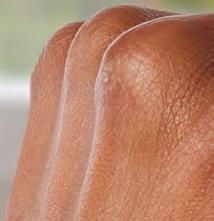






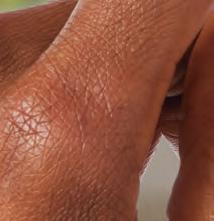






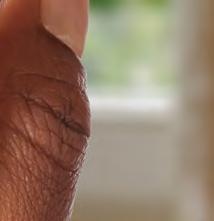














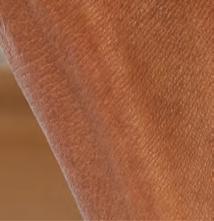






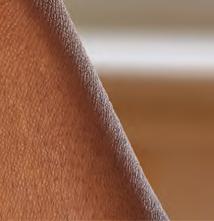








Jewish community turns to alternative noisemakers in the face of rising grogger prices
Tom Cohen and his wife, Melinda, approached Temple Israel with boxes of macaroni and cheese in hand.
The pair were there to see their daughter Shoshana perform in the congregation’s Purimshpiel and were using the lunchtime staple as fill-in noisemakers. Like many Jewish families across the country, traditional groggers had become cost prohibitive for the couple.
“I never thought I’d see the day where a simple grogger was so expensive,” Tom said. “I have to admit, I was ignorant to the fact that most domestic groggers are actually manufactured from parts made outside of the country, and as such, are victims of tariffs.”
In fact, the simple noisemaker, which used to cost approximately $5, has risen more than 100% in recent days.
“You know, there were also more expensive groggers,” Tom said. “I know the Shapiros had one passed down from their parents — who got it from their parents, who snuck it into the country when they got here from a village in Poland — that was worth a pretty penny. I was foolish. I also bought new ones from the same wholesaler I used for prizes for our Purim carnival. Like the Good Book says, ‘You reap what you fail to sow.’ I’m paying the price.”

Melinda said she found the choice to be simple.
“Do I like schlepping a box of mac and cheese like a schlemiel? Of course not. But this is where we are,” she said. “I’m not going to pay $10 or $15 for an aluminum noisemaker, quite possibly manufactured using illegal immigrants, when I can run down to Aldi and pay 75 cents for a fill-in noisemaker. Plus, we’ll have lunch after the performance.”
Across town Jacob Mendelson and his wife, Deborah, were on their way to share in a community Purimshpiel at the local JCC. They, too, substituted makeshift noisemakers for the now pricey groggers.
“I guess it’s just another case of the haves and have-nots,” Jacob said. “I’m glad some



people can still afford groggers. I guess I could afford them if I wanted to, but these one-pound boxes of elbow macaroni seem like a more prudent choice.”
Despite having to alter a generations-old tradition, Jacob said it was the blue collar workers for whom he had sympathy.
“I know the parts are sourced in Canada and Mexico, but the groggers are assembled in America and provided good jobs, at least for a few months out of the year,” he said. “Truth be told, I blame NAFTA. If we never moved our aluminum manufacturing out of the country, we wouldn’t be having these issues now.”
His wife said there were signs that came from outside of the Jewish community that she ignored.
“I have Christian neighbors who complained last year about the cost of eggs and the dye they used to color them for Easter. Like a fool, I ignored them thinking it wasn’t my problem. Well, we’re all paying the price now,” she said.
Despite the rising costs and scarcity of aluminum groggers, most congregations have vowed to continue staging their annual Purimshpiels.
“The Talmud is pretty clear,” Rabbi Max Levin said. “We’re supposed to blot out the name of Haman. I get it’s not the same to use a box of mac and cheese or Hamburger Helper but these are the times in which we’re living. I guess we can all take solace in the fact that, for now, the price of a bottle of slivovitz hasn’t risen too much.”
Following the success of rival Netflix’s “The Great British Baking Show,” Fressflix, a new streaming service, announced that “The Great Jewish Cooking Show” is slated to premiere this summer.
Like its U.K. predecessor, “The Great Jewish Cooking Show” will introduced a group of skilled amateur chefs showcasing their best dishes in a 10-week competition. The winner will be named “Nosher Macher” and will receive a silver-plated chopped liver mold.
TGJCS follows the general formula of TGBBS but promises some notable differences. While the contestants of the British version prepare their dishes under a tent in a bucolic setting, the Jewish competitors will find themselves shvitizing in a party room on the first floor of a Boca Ratan condominium.
Like its British counterpart, TGJCS will feature themed cooking challenges each week. Week 1 is “Schmaltz Week,” with the
first trial having participants create fourlayered dessert trifles. Each layer must have a chicken fat base and, adhering to kashrut laws, no dairy ingredients are allowed.
Subsequent episodes are “Kugel Week” (sweet and savory), “Gefilte Fish Week” and the crowd-pleasing “Kishke Week,” which features a showstopper challenge using stuffed intestines to create replicas of the Second Temple.
Celebrity judges Saul Hollywood and Prue Levy will taste-test all the dishes. Each week, they will name one person Star Chef and relegate the losing contestant to a room that smells like kasha.
Plans to grow Pittsburgh’s Jewish community revealed in writing Pittsburgh’s Jewish community is growing — in square feet. A memo obtained from the Greater Pittsburgh Jewish Coalition indicates a strategic path forward for regional landsmen.
“Per recommendations of an assigned task force, based on those of independent consultants secured by members of an earlier working group, is a proposal to purchase additional buildings in the East End neighborhood.”
The buildings, according to the memo, will be converted into synagogues.
“Based on perennial practices, as pointed out in the report from commissioned experts, one constant of Jewish life is prayer. As such, we believe the best way forward is back. Building more synagogues will give more people more pathways to live more Jewishly.”
Appended to the memo is a timeline dating to Babylonian rule demonstrating the prominence of permanent places of worship. Circles, check marks and a scribbled thumbs-up appear next to the El Ghriba Synagogue, Ben Ezra Synagogue of Cairo and Touro Synagogue. A QR code takes readers to copies of President George Washington’s 1790 letter to the Hebrew Congregation in Newport, Rhode Island, and President William Taft’s 1909 address at Rodef Shalom Congregation in Pittsburgh.
Authors of the memo, who declined to speak with the Chronicle, drafted their names in similar fonts indicating the likely use of Docusign.
“With warmer weather upon us and mortgage rates reaching a four-month low, Providence be our guide and history a diviner of good fortune,” the memo reads. “Rabbinic literature teaches ‘ein sicha ela tefilah,’ conversation is prayer. Come, let us build so that we may strive, seek, find and not yield.”
Sunday, March 16
1-3:30 pm
•DJ and Photobooth
•Inflatable Obstacle Course
•Bounce Castle
•Face Painting
•Kona Ice Truck
•Bunny Bakes Hamantaschen
•$10 per child, $40 for a family of 4 or more
•Wear a costume and get 5 extra tickets!
•Bring donations to help pack our own Mishloach Manot
JCC Squirrel Hill 5738 Forbes Ave, Pittsburgh PA 15217 Snyder Family
Register HERE!
Sunday, March 16
two sessions available: 9:30-11:15 am & 10:45 am -12:30 pm
•Carnival Games and Prizes to register: $18/family
Inflatables • Games • Crafts & MORE costumes encouraged!




Will Udon, son of Rebecca and Paul L. Udon Jr., will become a bar mitzvah on Saturday, Mar. 15, 2025, at Beth El Congregation of the South Hills. Grandparents are Judy and Stanley Weisfield of Smithville, New Jersey, and Marian and the late Paul L. Udon of Industry, Pennsylvania. PJC Rabbi Moishe Mayir Vogel

Every year, as the festival of Purim approaches, you hear people reminding one another of the Torah’s allusion to the fact that Purim is even greater than Yom Kippur: The Torah calls Yom Kippur “Yom Kippurim,” which can be understood as “a day like Purim”; Yom Kippur is holy and important, sort of “like” Purim, but not quite there.


Why would we say that the boisterous, fun Purim holiday outranks the solemn and sublime day of Yom Kippur? How could that possibly be?
when things don’t just go from extraordinary to ordinary, but from ordinary to horrific, how would we feel then about being His chosen ones?
When being chosen no longer means free rides on the wings of eagles but instead open season on Jews, how would we feel then about our chosen status?
As Jewish history unfolded, the first real test of that great question was the story of Purim. When Jerusalem fell and Israel was in exile far from home, and the mighty king happily signed the evil Haman’s Jewish extinction order, when no help was in sight and no hope was to be had, the question was asked, and the Jews would now respond. How did we feel then about being Jewish, about being G-d’s chosen ones?








Yom Kippur, in addition to being the universally familiar day of atonement for sins, has historic significance as well. Yom Kippur is the day G-d signed off on His forgiveness for our having worshipped a golden calf 40 days after the revelation at Mount Sinai. After months of repentance and prayer, we finally received a full, joyful, Divine pardon on Yom Kippur, and along with it, a fresh set of Ten Commandments. (And that is why Yom Kippur became the ultimate and eternal day of atonement.)
Seen this way, Yom Kippur is the final paragraph in the final chapter of the story of G-d giving us the Torah at Mount Sinai. What’s unique about that grand tale of awesome revelation is that it was largely one-sided. G-d did all the work. He brought us out of Egypt, He ran us through the sea, He gave us provisions in the wilderness, He ushered us to the foot of Mount Sinai, He told us He wanted to give the Torah, He revealed Himself to us, He proclaimed the Ten Commandments, and He chose us, in grand, dramatic fashion!
And we just stood there, blinking in disbelief, completely overwhelmed by the fact the Creator Himself had swooped in, lifted us off the trash heap of Egyptian slavery culture, cleaned us off, and assigned us royal status by declaring us His chosen ones for all time. One can imagine that when G-d asked us, amid all the drama, if we were in agreement and willing to become His People, it probably took us a moment to even realize He was talking to us, that He was asking us something and waiting for our answer. Still amazed by all the attention, we replied, “Naaseh V’Nishma!” — which literally means we’ll do and study whatever you say,” and also sounds something like, “Are you kidding us? Yes, of course!”
Suffice it to say we were swept off our collective feet. And therefore the unspoken question lingered: How would we do when the shock wore off, when the honeymoon ended, so to speak? When the thunder died down and the lightning faded out, when the drama ended, when we came back to earth, the manna stopped falling and the miracles ran out one by one — how would we feel then about being His chosen ones?
And then, when things really go south,
With the way we defied Haman and pushed back on his decree, and with the way we united around Mordechai and Esther, rediscovering our smoldering Jewish sparks of faith and pride, we showed that we felt fine about being G-d’s. With nothing to gain by being Jewish and everything to lose, not a single Jew crossed over to Haman’s side throughout all 11 months from the start of his decree until its demise.
It was a monumental test, one that would either make or break the validity of our ancient pledge of allegiance at Mount Sinai, and we passed with flying colors.
G-d started it at Mount Sinai and we completed it at Purim. Whatever questions remained after the ecstasies and agonies of the Sinaic revelation, the fall and the recovery, the crime and the pardon — Purim answered them all. Whatever remained untested after Yom Kippur was tested and proven on Purim. What Yom Kippur could not attest to, Purim did.
As we celebrate the second Purim after Oct. 7, 2023, we proved ourselves once again. The might and faith of the hostages who describe growing closer to G-d and their own Judaism while in captivity — they proved it for all of us. They proved once again that we were never in it for the benefits — we were in it for Him. The bliss of Mount Sinai was wonderful, but that’s not what we were betting on. We pledged ourselves to G-d for the same reason He pledged Himself to us: love.
And if that means we have a giant target on our backs, so be it. It’s worth it. We choose Him, come hell or high water. Haters gonna hate; we’re going to be Jewish. We stand with G-d because we are His partners, and we will not walk away from Him, even in Gaza, even in hell. It’s Purim all over again. And all over again, we have validated the commitments and vows of our ancestors. About 3,300 years ago they said we would stick to it no matter what, and in our generation, we are doing just that.
Happy Purim! PJC
Rabbi Moishe Mayir Vogel is executive director of The Aleph Institute – North East Region. This column is a service of the Vaad Harabonim of Greater Pittsburgh.




ALPERT: Florence Alpert, née Sugerman, 89. Beloved mother of Alisa (Kenneth) Kaplan, Robyn (the late Wayne) Topel and Sharyn (Ira) Barsky; cherished grandmother of Courtney (Luke) Bradford, Austin Kaplan, Brittany Kaplan, Ivey Topel, Griffin Topel, Madison Barsky and Emersyn Barsky; proud great-grandmother of William; dear sister of Helene (the late Paul) Pretter; loving aunt, cousin and friend to so many. In lieu of flowers, memorial contributions may be made to the American Cancer Societ y, cancer.org Chapel service was held at Shalom Memorial Funeral Home, 1700 W. Rand Rd., Arlington Heights. Interment followed at Shalom Memorial Park. For a link to leave condolences, go to shalommemorial. org, 847-255-3520.

Contact the Development department at 412-586-2690 or development@jaapgh.org for more information. THIS WEEK’S YAHRZEITS —
Sunday March 16: Dr Simeon Allen, Bella Bonder, Ida Sisser Bortz, Malvina Chotiner, Clara Cohen, Isidor Davis, Mildred Cohen Feldman, Sadie Fink, Anna Fireman, Dr Ben Greenberger, Alexander Handmacher, Miriam Keilly, Bessie Kempler, Ella Klein, William Lederer, Ella Miller Lewine, Abe Albert Lewis, Adolph Lobl, Helen Miller, Louis Pechersky, Lucille Pollock, Aaron Pretter, Evelyn Rebb, Esther Ruben, Ralph Rubinoff, Jean Y Shapera, Mollie Silverman, Minnie L Sokole, Sadie M Speer
Monday March 17: Rebecca Adler, Marjory S Eiseman, Dorothy Friedken, Ida Goldberg, Rachel E Goldberg, Dr Norman Golomb, Lillian Hellman, Gerhart M Horewitz, Edwin Langue, Ida Levy, Jennie Lewis, Isaac Marcus, Bessie Michelson, Mildred S Moss, Albert Rapport, Sylvia L Samuels, Hyman David Segal, Manuel Selker, Edna M Siegal, Goldie R Siegel, Genevieve Stern, Nathaniel Stutz, Isaac Young
Tuesday March 18: Joseph Abravanel, Louis Cohen, Solomon Evelovitz, Esther S Finkelhor, Mollie Friedman, Nisan Gilboa, Sophie Goldman, Harry H Green, Johanna Halle, Harold M Harris, Martin A Hepps, Ruth Kaplan, Samuel Katz, Rosia Kauffman, Rose Kertman, Helen S Latterman, Edward Lewis, Samuel Lichtenstein, Shirley F Little, Philip Mallinger, Judith Moritz, Jennie Ostrow, Benjamin Rambach, Max Reifman, Sam Rosenberg, Sarah Schwartz, Marvin Sniderman, Mayme Sukolsky, William Taylor, Sara Weiner
KRAMER: Ruth Kramer passed away on Feb, 19. She was born in Pittsburgh on April 3, 1927, to Sarah and Hyman Bales. Ruth was the beloved wife of the late Herbert Kramer, beloved mother of the late Lois Kaplan and Jeffrey Kramer, grandmother of Jason Samreny, sister of the late Yvette A. Levy and the late Samuel Bales. She had many loved nieces and nephews. She will be missed by family and friends.
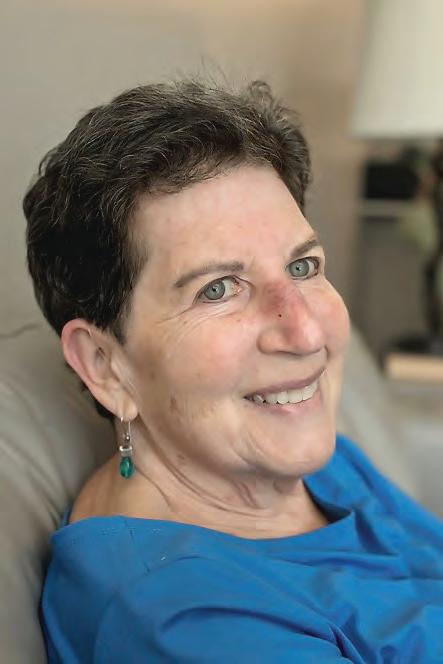
MILLER: Louise Sharon Miller, a native of Pittsburgh, was born on July 28, 1948. She was the oldest child of Harry and Clara Weinberg. Louise graduated from Point Park College in 1970 with degrees in psychology and education. She had 31 years of experience as a real estate agent, serving as past president of the Greater Louisville Association of Realtors and starting her own real estate business, The Miller Team, with her beloved husband, Dennis. Nothing brought Louise more joy than hosting friends and family in her home for celebrations like Thanksgiving or Passover. She was a wonderful cook and gracious host, who always had room at her table for someone she adopted as a part of her family. This hospitality extended to her community service as a founding board member for Child’s Spirit, Inc., which helps families with children who have medical needs or financial challenges. Louise was a faithful member of The Temple, where she sang in the choir, served as an office volunteer, and shared her gifts for cooking and hospitality. Louise is survived by her husband of 34 years, Dennis; her children, Bradley McKay, Todd McKay, and Melanie Sparks; grandchildren, Noah, John, Ezra, Asher and Emerald; her brother, Michael Weinberg; sister, Susan Weinberg (Tom Quick); niece, Sarah; nephew, Danny; and many close cousins and family members. The family would like to thank the wonderful staff at Everlan of Louisville and Dominion Senior Living for their care of Louise during her final years. Memorial donations can be made to The Temple (thetemplelouky.org/) or Col. Potter Cairn Rescue (cairnrescue.com/).
ROFEY: Rhoda Rofey, on Sunday, March 2, 2025. Beloved daughter of the late Leonard and Celia Rofey, of blessed memory. Beloved sister of Paula (of blessed memory Daniel) Singer of Tucson, Arizona, late Marlene and Marvin Kaufman (of blessed memory). Aunt of Jodi (Guy) Gabriel, Dana (Cheryl) Kaufman, Kimberly (Andrew) Robinson, Kevin Singer and Keith Singer. Great-aunt of Brenna (Alex) Nadelman, Sydney (Jordan) Mellowitz, Brett Robinson, Lindsay (Michael) Serviensky, Spencer (Rachel) Kaufman, Jasmine Singer, Cameron Singer, Celia Singer and Levi Singer. Great-great-aunt of Nell D. and Nash H. Nadelman, Juliette M. Serviensky and Drew M. Mellowitz. Rhoda took great pride in the many accomplishments of her family and pleasure in attending their life cycle events. Graveside services and interment private. Memorial donations may be made to Make-A-Wish Foundation, 707 Grant Street, Suite 3700, Pittsburgh, PA 15219. schugar.com
Wednesday March 19: Frieda Alper, Mollie Chamovitz, Frances Light Feinberg, Philip Friedman, Nathan H Gross, Rebecca Marks, Ethel Miller, Hattie H Rapoport, Jacob M Rose, Rose Roth, Harry Scott, Arthur J Stern, Ruth Stern, Sadie Weiss, Robert S Yecies, Joseph Ziner
Thursday March 20: Anna Bernfeld, Morris J Bialer, Estelle H Braver, Rose Cohen Calig, Frank R Cohen, Goldie Davis, Anne S Debroff, Ike Diamond, Pearl M Feinberg, William Fried, Rebecca Friedberg, Nathan Glosser, Sadie C Heller, Sophie Hersh, Leonard B Jacobson, Lena Kaufman, Albert C Kramer, Samuel Linetsky, Payce Lipkind, Joseph M Orringer, Rae Venig Rubin, Florence Schorin, Leonard L Schugar, Leonard Schwartz, Hyman Shalansky, Ben Shanker, Fannie Siegel, Elvin Teitelbaum, Isaac Weis
Friday March 21: Samuel L Alpern, Sarah Dorothy Cohen, Leo Gitelman, Gerald B Greenwald, Harry Greenwald, Jacob L Gropper, Lily June Kanarek, Morris Klein, Saul A Kwall, Earl Lebovitz, Sam Lewinter, Carl Lieberman, Julius Jakob Maas, Harry Margolis, Fannie Melnick, Abe Miller, Sally Miller, Darlene Robinowitz, Ethel Bodek Rogers, Clara Saltman, Max Samuels, Birdie H Schwartz, Manuel Wikes, George Wintner
Saturday March 22: Bella Bilder, Sidney Bilder, Henry Bloch, Bailie Anna Cohn, Sedalia Ekker, Rita M Friedman, Charles Gilles, Clara Goldhammer, Frances H Gordon, Joseph Greenwald, Hyman L Hausman, William Hinkes, Haimen Kauffman, Abe Kirshenbaum, Edward Lewis, Abraham Pervin, Al N Plung, Jack Sarbin, Hannah Rae Shapira, Benjamin Siegal, Vera Silverman, Fannie G Tavernise, Henry Weinberger, Samuel N Whiteman, Joseph Wilkofsky, Manuel Zapler




















“Learn to sit back and observe, not everything needs a reaction.”









Continued from page 19
TANNENBAUM: Dr. Stephen A. Tannenbaum. It is with profound sadness that we announce that Dr. Stephen A. Tannenbaum, age 85, passed away on March 5, 2025. Born on June 9, 1939, in Pittsburgh, to Herman and Frances Tannenbaum. He was a graduate of Peabody High School and earned his DDS in 1964. While attending the University of Pittsburgh, Stephen met the love of his life, Shirley (Cohen). Stephen and Shirley built a life filled with love and joy. They were married for over 61 years and were blessed with two children: Gary (Eileen) Tannenbaum and Jamie (Rob) Titterington. Stephen was also a beloved grandfather, or “Pa” as he was called, to Steven and Kate. He is also survived by sister Diane Leone, sister-in-law Arleen Adelson and loving nieces and nephews. Stephen practiced dentistry in Greensburg for 37 years before moving back to Pittsburgh. Stephen had a beautiful singing voice that he graciously shared for years as a cantorial singer at Temple Emanu-El Israel in Greensburg. Stephen was also an incredibly talented writer who was always creating characters in his head, and he was the proud published author of multiple books and short stories. A lifelong learner, Stephen was an avid reader; he also loved jazz music, crossword puzzles and attending classes at OLLI. He filled the lives of his family and friends with love and laughter, and his passing leaves an immense void. Services were held at Ralph Schugar Chapel, Inc. Interment at B’Nai Israel Cemetery in Greensburg. Contributions in Stephen’s memory may be made to Humane Animal Rescue of Pittsburgh (humaneanimalrescue.org) or Temple Sinai of Pittsburgh (templesinaipgh.org). May his memory be a blessing to all who knew him. schugar.com PJC
This is one in a series of articles about Elder Law by Michael H. Marks., Esq. Michael H. Marks is an elder law attorney with offices in Squirrel Hill. Send questions to michael@marks-law.com or visit www.marks-law.com.
Don’t overlook or forget about these estate planning issues.
I’ll just appoint my oldest child: Choose the best people you can to help you or carry out your wishes, for jobs such as Executor under a Will, Agent under Power Of Attorney, Health Care Agent, and (especially) Guardian of Minor Children.
I named an executor, that’s good enough: Always name a successor, backup or substitute for anyone you will appoint to important jobs. If your first choice isn’t available to serve when the time comes, you get to choose who you want to step into that spot, not someone you don’t want.
My family doesn’t need to know: Talk with your family about these planning issues! Communicate with them if you can about your finances, your assets, your choices and preferences, especially about money and end-of-life treatment decisions. Often, after a parent has died, children are totally in the dark about the assets and estate, or about the choices you made in your estate planning arrangements. Not everyone can have this kind of conversation with their kids, but if you can, communicate now about these issues to try to prevent bewilderment, searching or even adversarial disagreements later.
I did my estate planning, it’s probably still good: Review and update your estate planning documents as needed. Sometimes there are changes in the cast
of characters that you need to take into account –people coming and going, by death, divorce, marriage, birth of a child, children become adults etc. Or it may be that your wishes have simply changed and now you want something different. Or perhaps your finances have changed significantly (Note that ordinarily you don’t have to update your will, etc., just because someone has moved to a different city than was previously stated.)
I don’t need estate planning because I’m not rich: Don’t neglect your estate planning because “I don’t have that much.” If you have a family, you owe it to yourself and to them to make appropriate arrangements for the future, to avoid confusion or even disputes later. Whether you have a little or a lot, it’s yours. It should go to those you want, and not anyone else. You probably also want to say who will be in charge of the process, to help you during your lifetime, or settle your affairs after you are gone.
Digital assets and online activities: Make sure your planning (e.g. Will and Financial Power Of Attorney) include arrangements to authorize your chosen representative to access your online and digital assets. This could be anything from online banking to emails to Facebook photos. Pennsylvania has a law to allow this, but additional provisions in your estate planning documents will help your Agent under POA or Executor to be able to do so.
What, for my kids? When your child turns 18, it can be good for them to do some basic estate planning. They may not need a Will yet, but Power Of Attorney will make things much easier in case they should become disabled.
Of course I have my kid on my account with me: Having your bank account joint with just one child e.g. your oldest, for convenience, means
that when you go, the proceeds go automatically to that child, ONLY, possibly to the detriment of your other children. One idea is to just keep enough money in that account for your child to have ready access to some cash if something bad happens to you, but keep larger amounts of money in other accounts.
But I worked hard on this estate: Sometimes it’s a mistake to pay yourself an executor’s fee for administering an estate. An executor’s fee is taxable income – compensation paid for services rendered – and your personal income tax marginal rate might be 12% or 24% on the next dollar of income. But if you’re the sole beneficiary of a parent’s estate, for example, and you leave the money in the estate to just receive it as a bequest or inheritance, then the inheritance tax rate is only 4.5%.
No matter what happens, I don’t want THEM

in charge: Don’t hesitate to disqualify or exclude from serving in positions of responsibility, anyone who you absolutely don’t want to ever be in charge of you or your affairs.
It’s here somewhere: Organize your financial and other important information. Let the person who will be in charge know where it can be found.
Use retirement account money to benefit charities: Use qualified retirement money like IRAs to make charitable gifts. The charity won’t have to pay income tax on IRA money it receives, like an individual beneficiary would. (But be careful and get advice on how to name charities and individuals designated.)
At Marks Elder Law, we help people every day with issues like these. I invite your questions and feedback. Please let me know how I can help you and your family.



Contact me today to discuss all of your real estate needs!
Sherri Mayer, Realtor Squirrel Hill Office C: 412-760-0412 O: 412-421-9121x225 sherrimayer@howardhanna.com HowardHanna.com

www.kaminrealty.kamin.com 5125 Fifth Ave. 2 & 3 Bedrooms Corner of Fifth and Wilkins Spacious 1500-2250




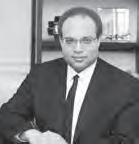




Smith-Rosenthal Team
Jason A. Smith & Caryn Rosenthal
Jason: 412-969-2930 | Caryn: 412-389-1695 Jasonasmith@howardhanna.com Carynrosenthal@howardhanna.com

Baum Blvd. Pittsburgh PA 15232 Shadyside Office | 412-361-4000




























Amy Weiss to schedule your advertising aweiss@pittsburghjewishchronicle.org 412-613-0697 advertising@pittsburghjewishchronicle.org












By Alan Zeitlin | JNS
When singers Polina Fradkin and Paulina Levi got 50,000 Instagram followers, they cele brated with a cake.
But these days, they are really cooking.

The Shvesters (the Yiddish word for “The Sisters”) now have 134,000 followers on Instagram and 24,500 on TikTok.
In the history of Jewish music, female duos are fairly rare; Jewish female duos singing in the Yiddish language are rarer still. Not all of their tunes are in the mamaloshen (“mother tongue”); about 40% are in Hebrew and English.
The Shvesters’ American tour this month includes several shows, including two at the Museum of Jewish Heritage‒A Living Memorial to the Holocaust in New York City; one at the Weitzman National Museum of American Jewish History in Philadelphia; and another at the Berman Center for the Performing Arts in Detroit. In these performances, they are accompanied by guitar or piano.
Fradkin, 30, who was born by the Ural Mountains in Russia, said the group has risen due to 30-second videos of the pair singing, which look effortless but aren’t. Each video takes about a day to do — from an hour or two to arrange the song, rehearsing, picking outfits and then shooting the video, which can take anywhere from one to four hours.
“She does the melody and holds down
the fort, and I’m kind of the instrument to her voice,” says Levi, 26. In one, “Kol Ha’lam Kulo,” they sing in a stairwell, with the acoustics hauntingly beautiful.
The two were good friends at Frankel Jewish Academy in Detroit, where they sang in the choir and performed in the plays. They made it a point to say they “were not cool in high school.”
But it seems they are now.
Fradkin said she was moved by one person who cried and said, “I live somewhere without any Jews, and I listen to your music when I light candles. That’s my way of doing Shabbat.”
As partly an homage to the Barry Sisters — Clara and Minnie Bagleman, popular from the 1940s to the 1970s for their “Yiddish Swing” — they incorporate a similar traditional style, updating it for contemporary listeners.
Levi says their “Eishet Chayil” (“Woman of Valor”) and “Tumbalalika” have gotten the best receptions.
‘Jewish pride is the antidote to hate’ Everything, however, isn’t coming up roses.

They are also sometimes the recipients of online hate with people lobbing angry comments toward them. “I delete it and laugh at it,” says Levi, while Fradkin says all feedback boosts the algorithm of their music shares.
They do note that they have security
And, of course, with the sometimes gut-wrenching news from Israel and rising antisemitism everywhere else, Fradkin thinks that people need positivity coming from their roots. “We believe that Jewish pride is the antidote to hate,” she says. “It’s our God-sent mission to bring joy and light, and to remind people what it feels like to be a proud Jew and love who you are.”
Levi notes that she started training her voice at the age of 14 and later honed her skills at the Berklee College of Music in Boston. She adds that their secret weapon is Fradkin’s grandmother, who consults with them and offers some extra training. “I don’t know if a lot of people are privileged to have that resource for their music,” Levi says.
Women often play other “helpful” roles, too: After the shows, mothers and grandmothers approach them in an attempt to set them up with their sons or grandsons. While Levi is married and Fradkin is in a relationship, they both say they are flattered, even honored, by the kindnesses they receive.
‘Our shows are absolute bangers’ Now, don’t expect the Shvesters to belt out a Taylor Swift song in Yiddish, though that has nothing to do with other artists but with their own traditional sensibilities.
“I think it’s a little schmaltzy — this translating pop into Yiddish,” Fradkin says. “There is a guy who does it, and it’s his shtick and it’s cute. It’s very him. But that’s not us. We like to do the classics. We transform the oldies into something fresh.”
After graduating from the University of Michigan some eight years ago, Fradkin left for Israel to study as part of a Fulbright Research Fellowship in music and decided to stay.
“The community is amazing, the music is amazing, and life here is amazing,” she says. “I’m privileged to be a Jew in the modern age where there is a Jewish state, and I want to take advantage of it.”
Levi returned a few months ago and says her love for the country made her want to be there, too.
While some believe that there is a stigma to Yiddish — “it’s so old-fashioned” — the duo says people of all ages are energized by it, and young fans have been a reason that shows have sold out.
Their top priority, they say, is that live performances are memorable for musicianship and performance, and are geared to audiences of all ages. (But not, they acknowledge, for observant Jewish men due to “Kol Isha,” a religious law that prohibits them from listening to women’s voices.)
“Our shows are absolute bangers,” insists Fradkin. It’s not just a show for your grandmother.”
And are the women concerned about singing in Yiddish being marketable?
“No,” Fradkin states. “Niche is king.” PJC



















Talking shop outside the shop
Employees of Bunny Bakes and representatives of The Beacon visited Winchester Thurston School to speak to teens about inclusive employment opportunities. Following the chat, attendees decorated cookies.

Pre-Purim make and take Community Day School hosted a hamantaschen make and take. Participants made triangle-

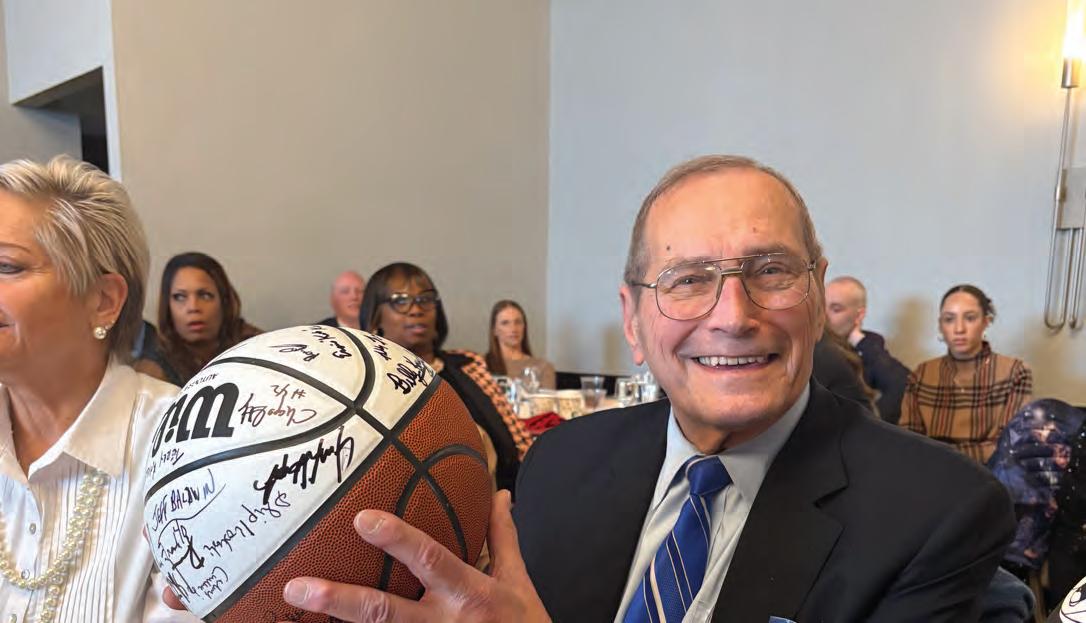



Alan Frank was inducted into the Pittsburgh Basketball Club Hall of Fame on March 2. Frank, a standout player for Carnegie Tech and Schenley High School, was inducted into the “Legends Division.” Pittsburgher Abraham “Abi” Zablow was recognized at the CTeen International Shabbaton for inspiring Jewish pride. A story regarding Zablow’s efforts to encourage people to don tefillin was featured on giant screens in Times Square. The New York City-based gathering included 4,000 Jewish teens from 60 countries.






Michael Solomonov & Steven Cook Present Zahav Home
Wednesday, March 26 at 7:30 p.m.
Congregation Beth Shalom
Walk-ins Welcome - $25/each at the door





Advanced Registration - $20/each (Students - $5/each)






Book signings & sales after the event





$5/eac h) or scan QR code on this flyer.
